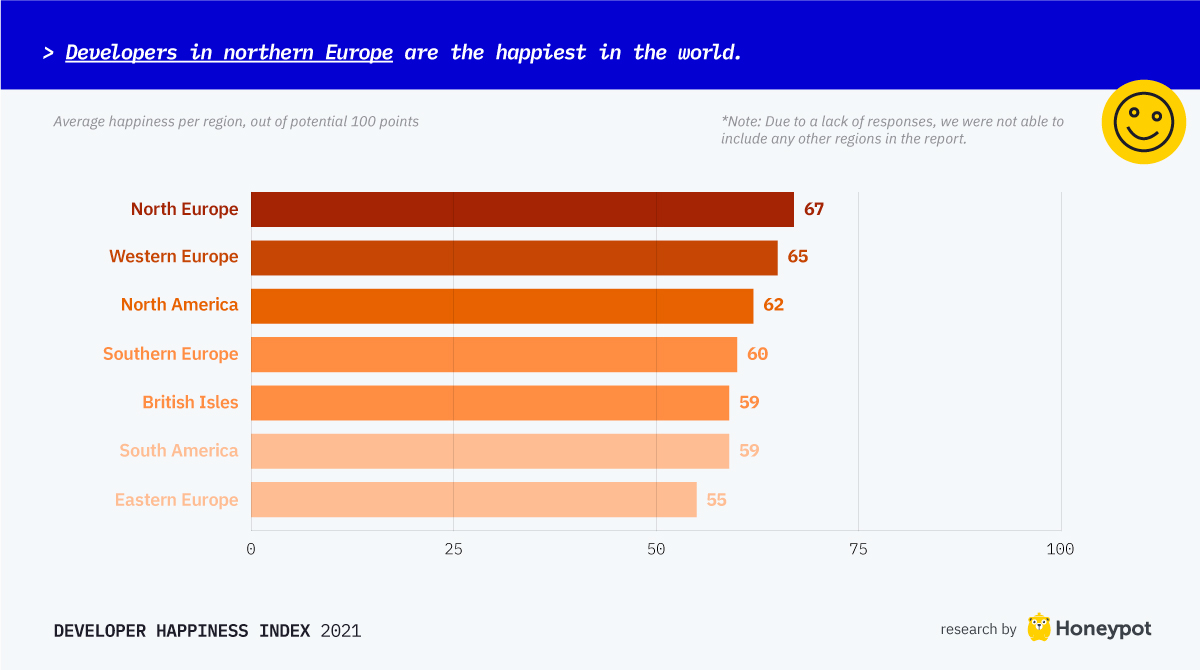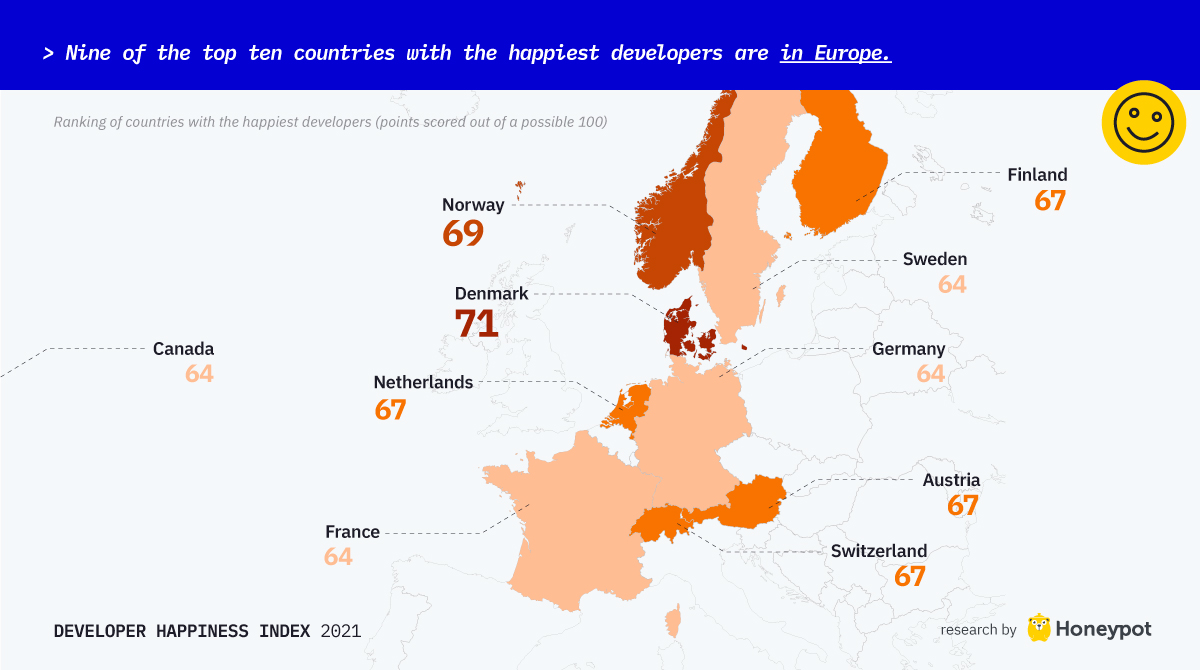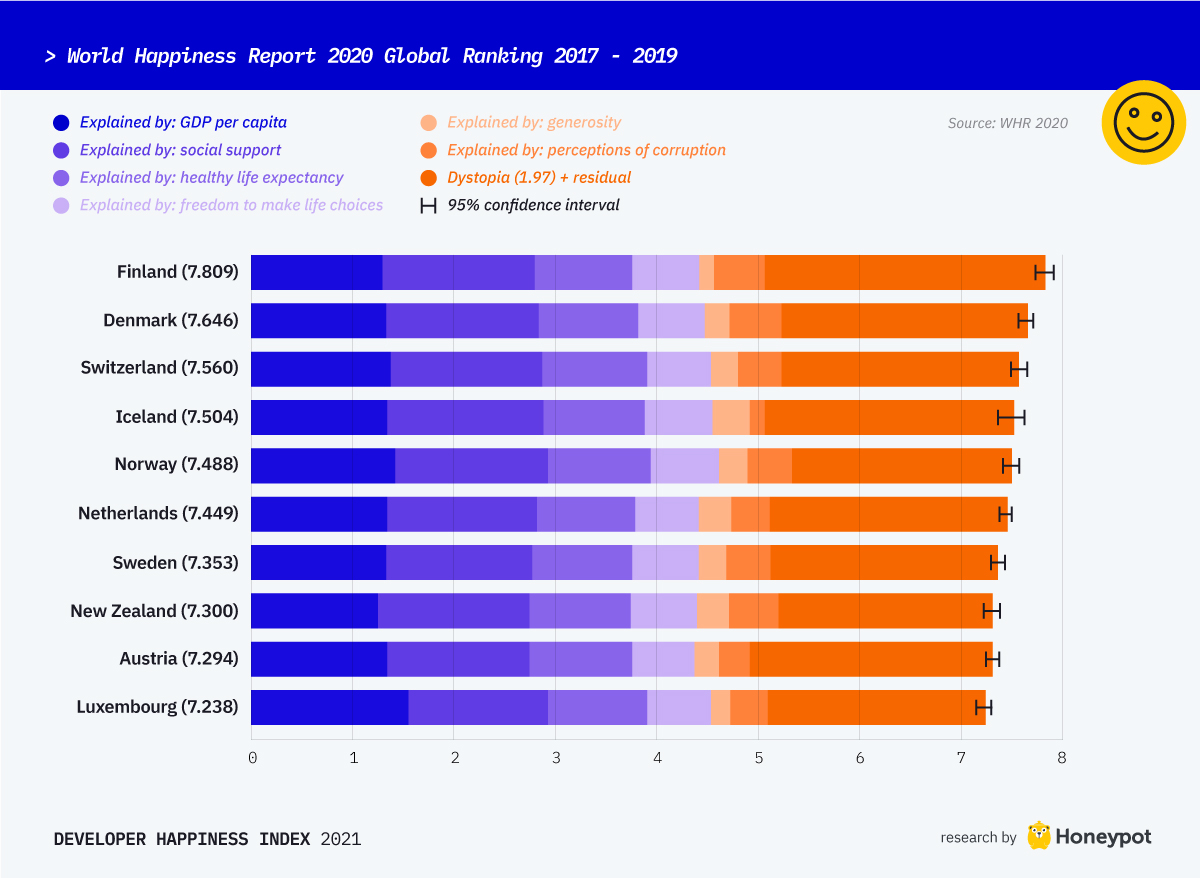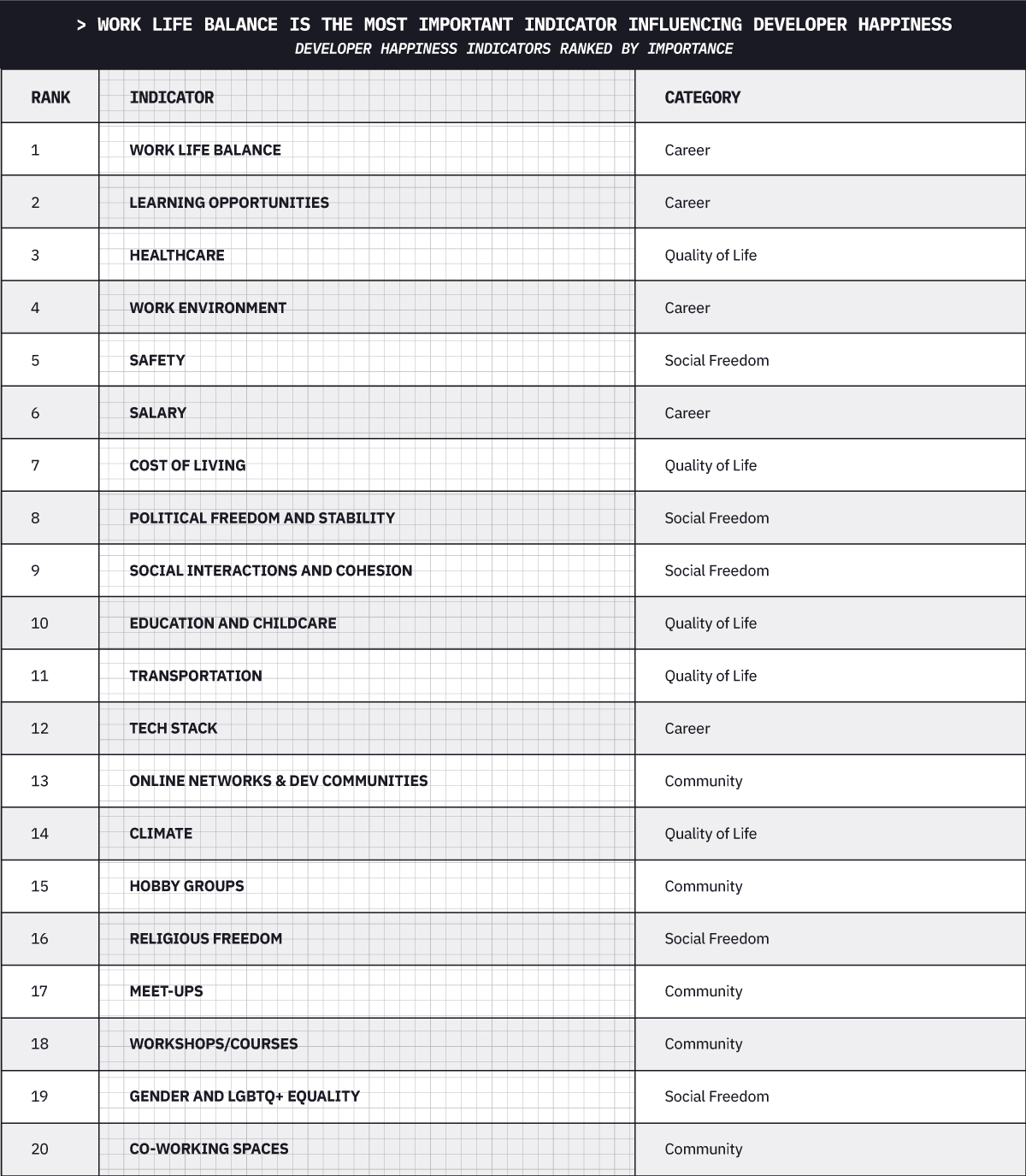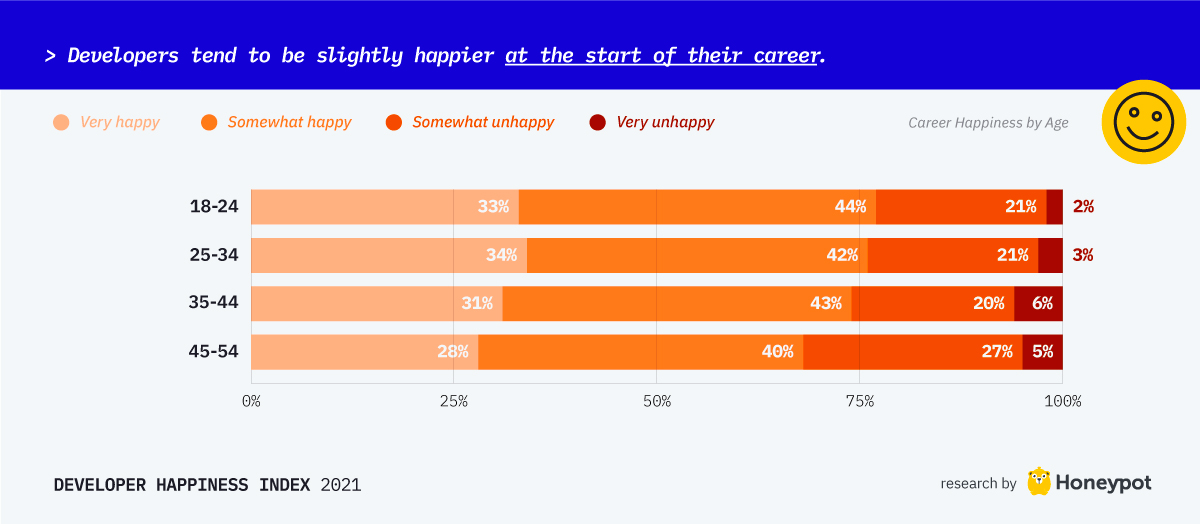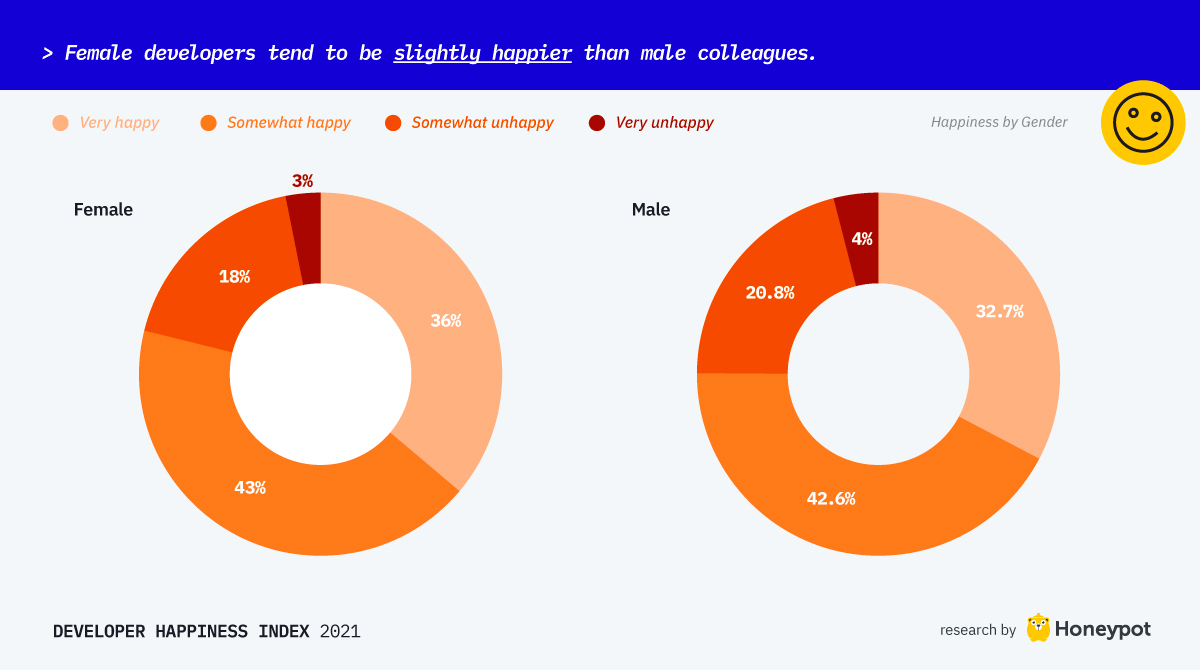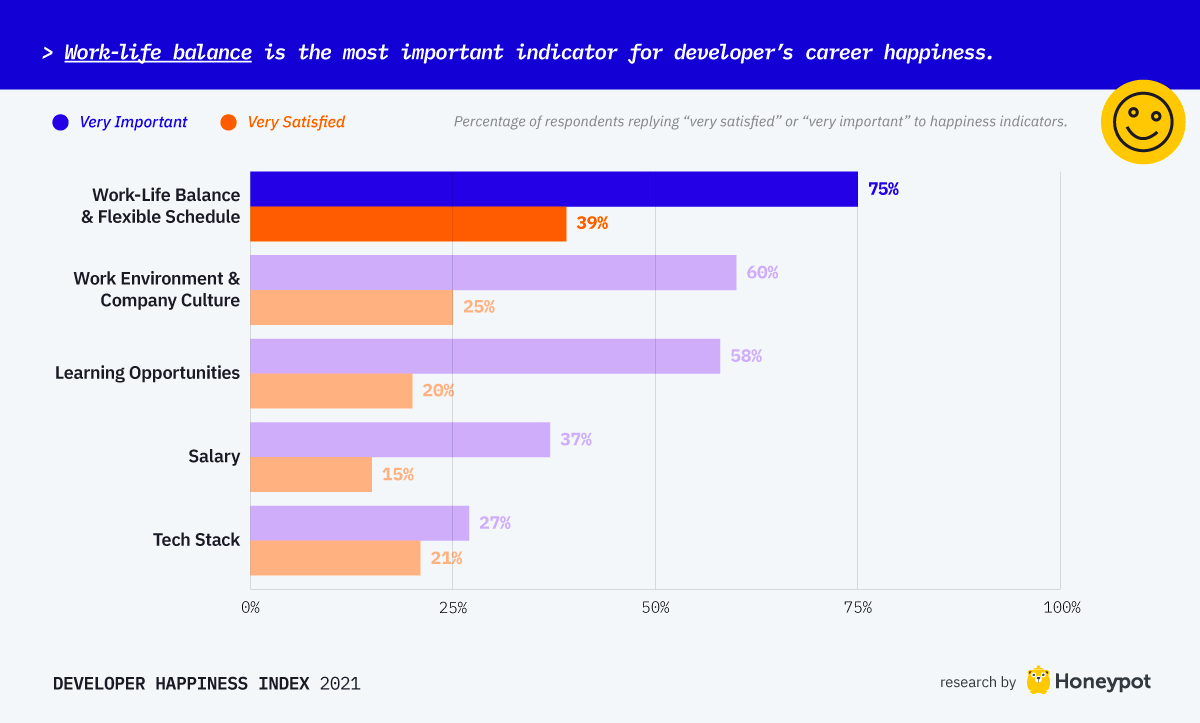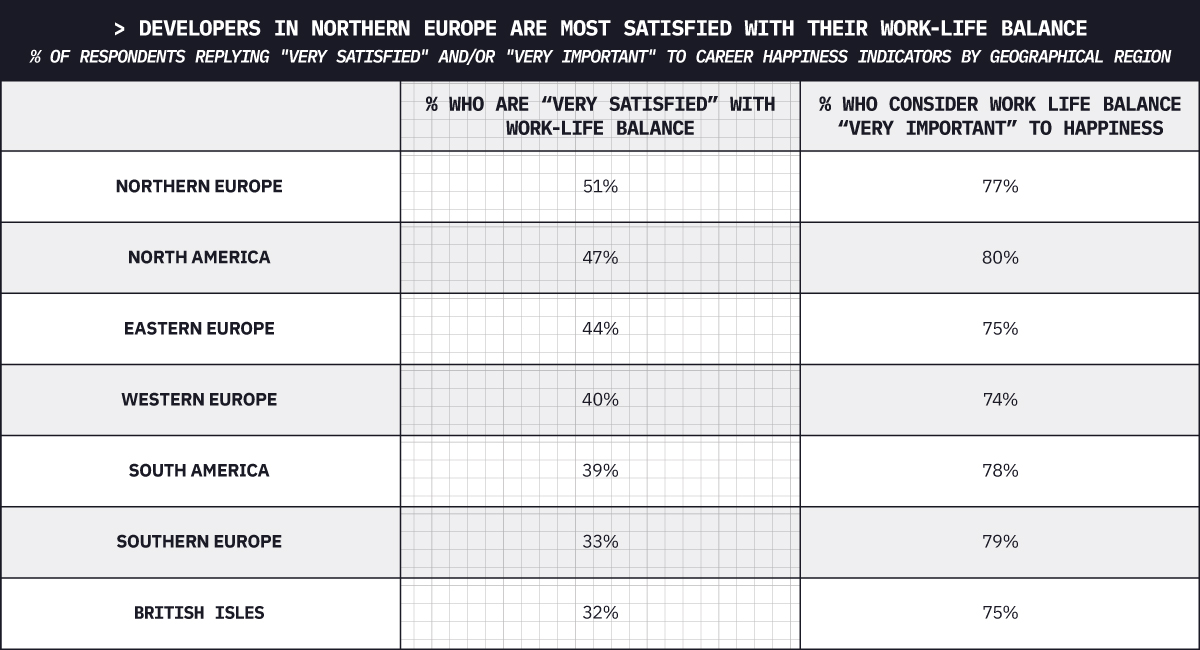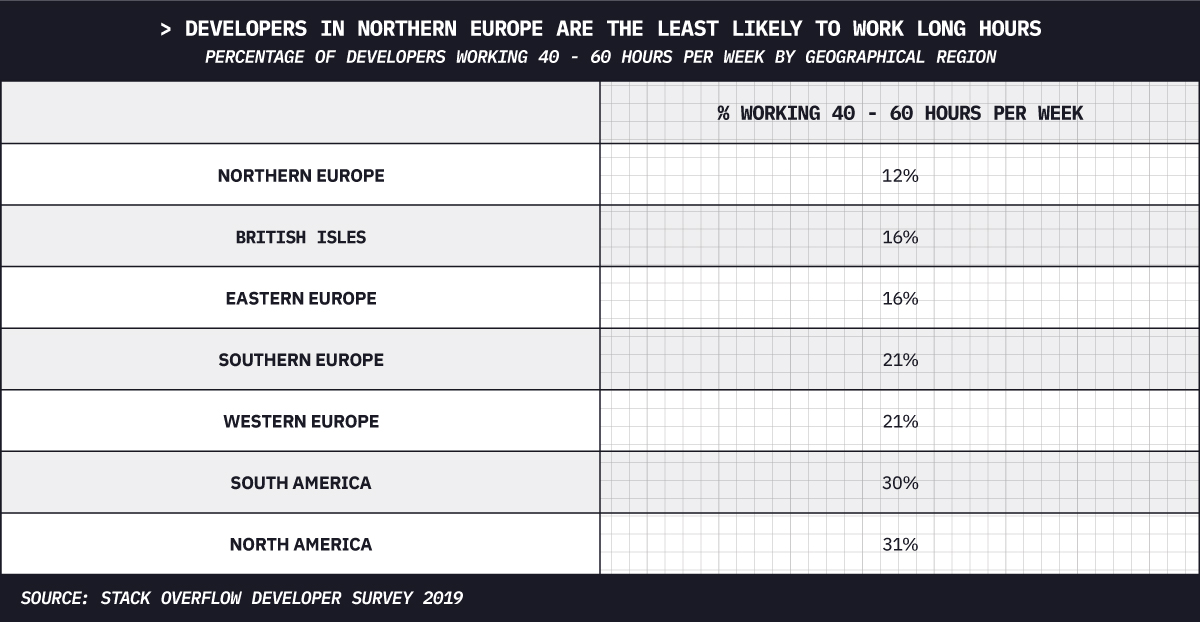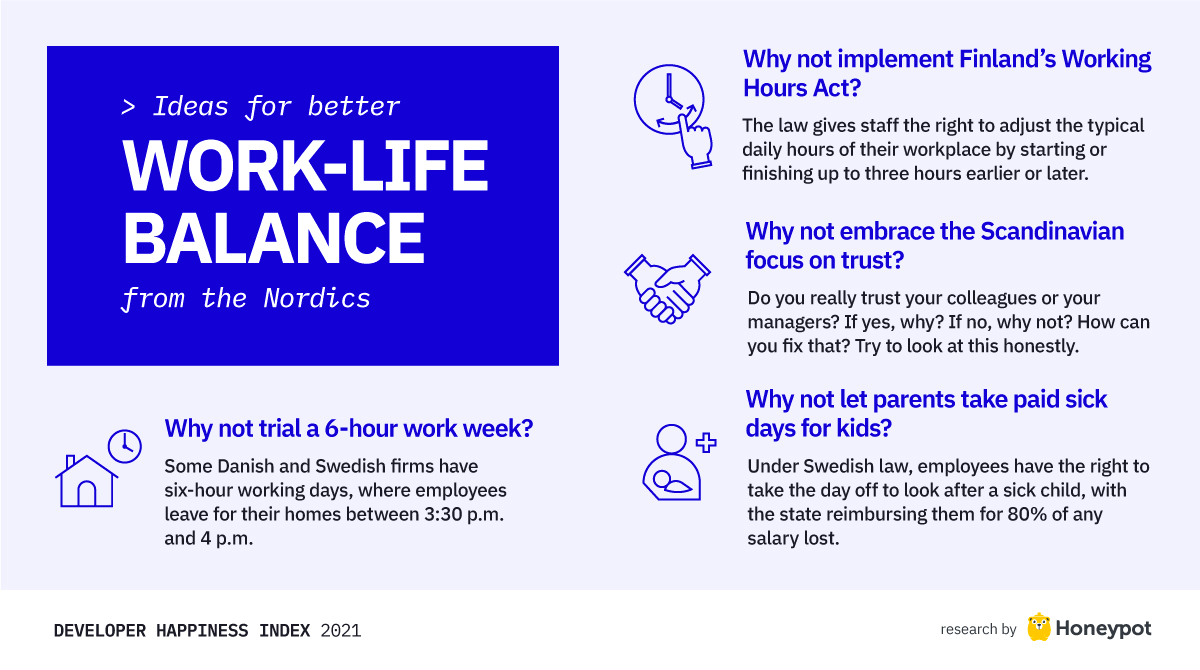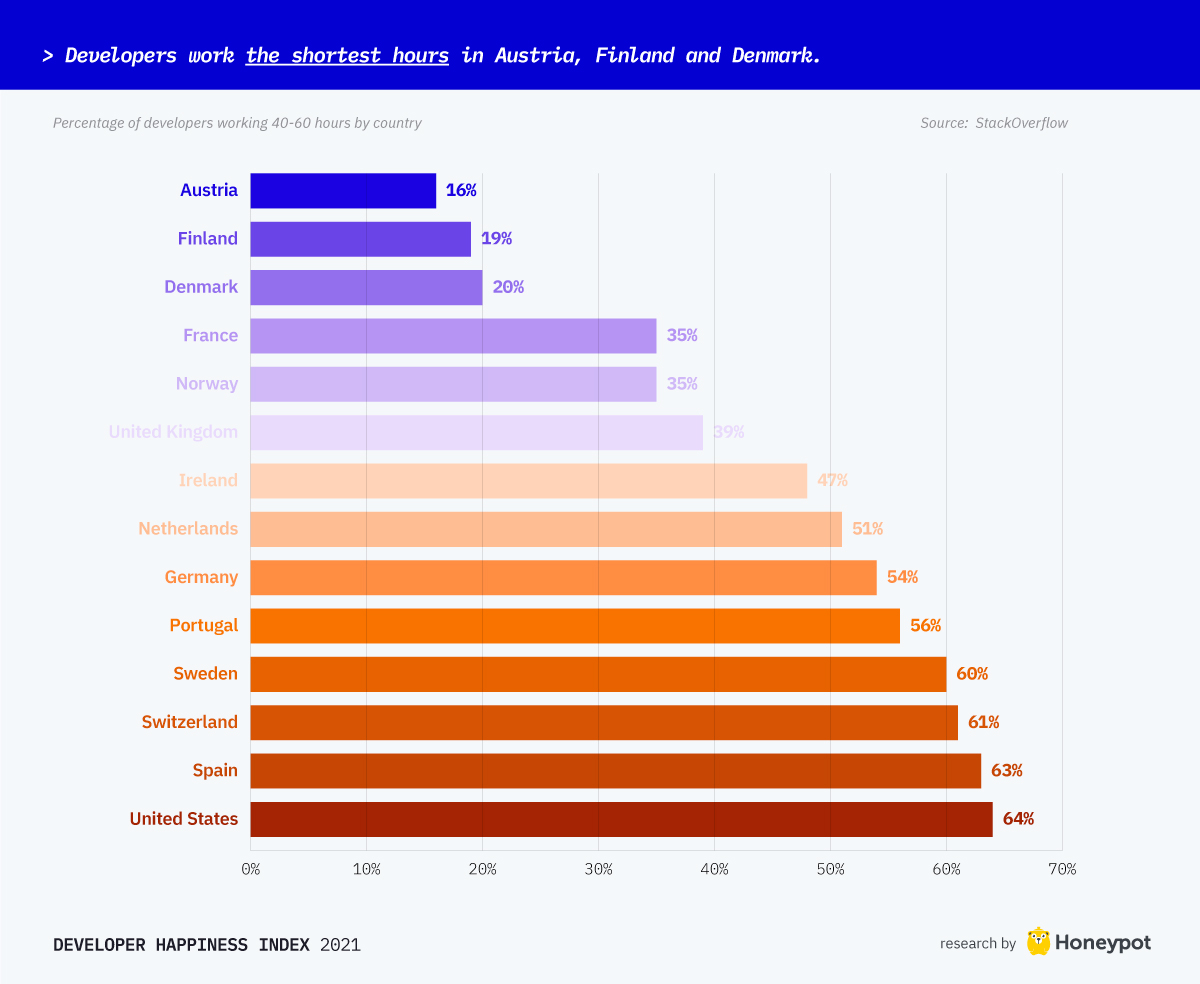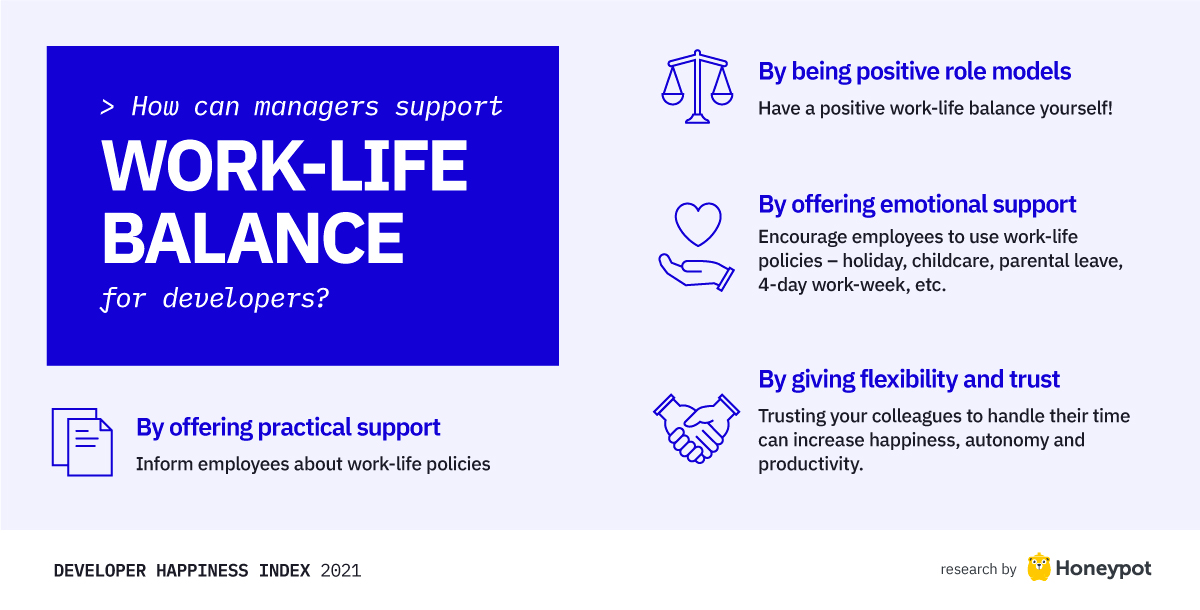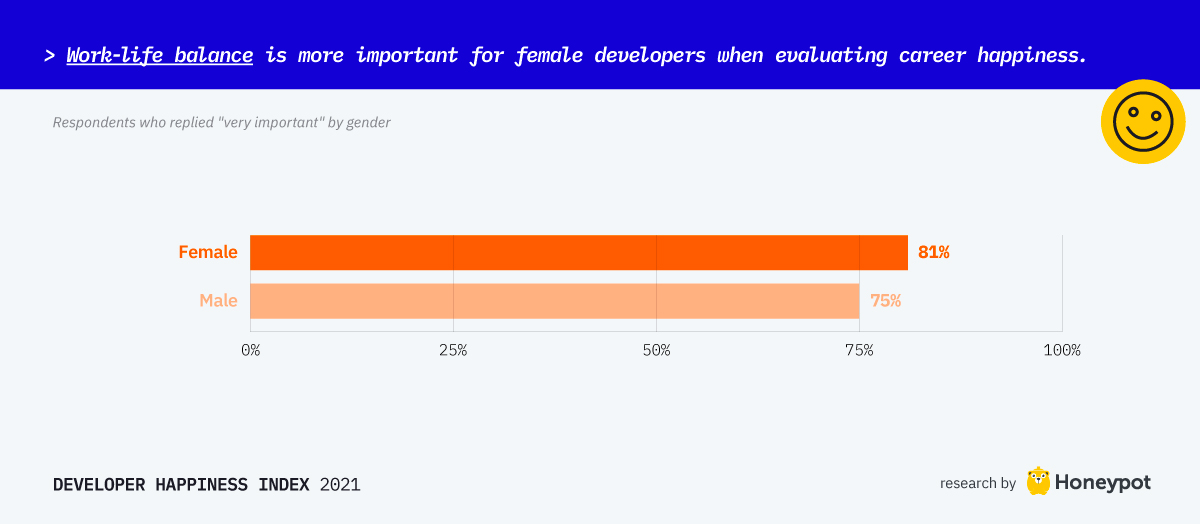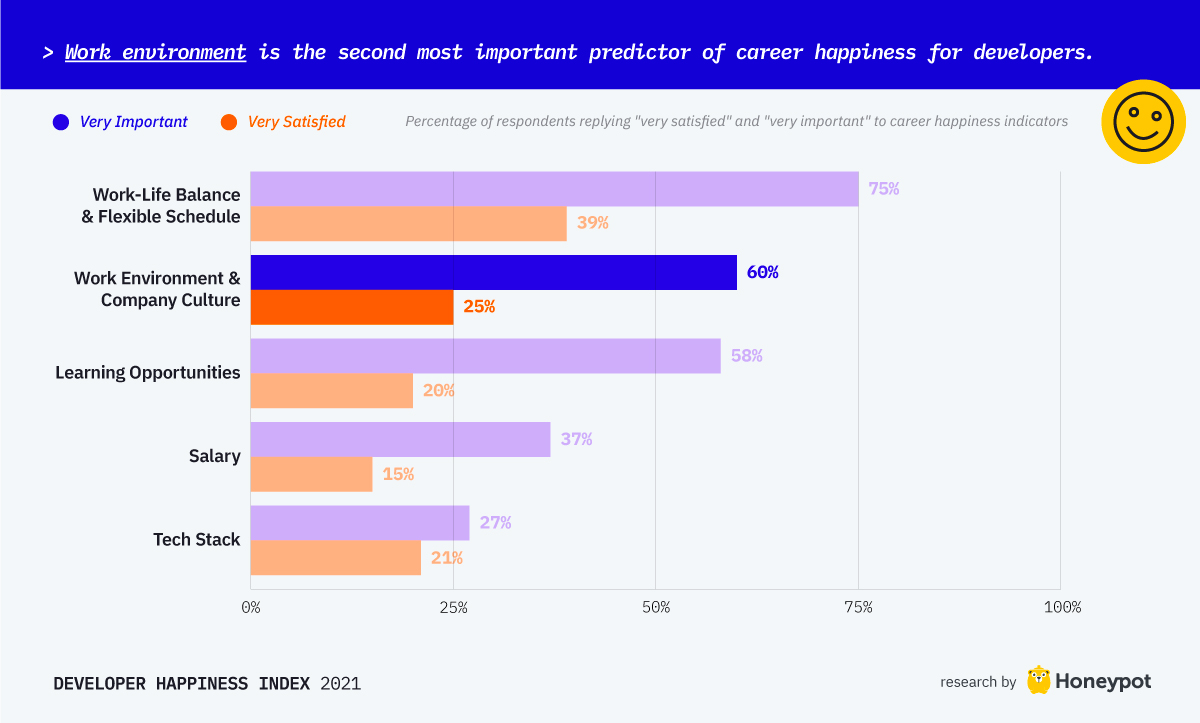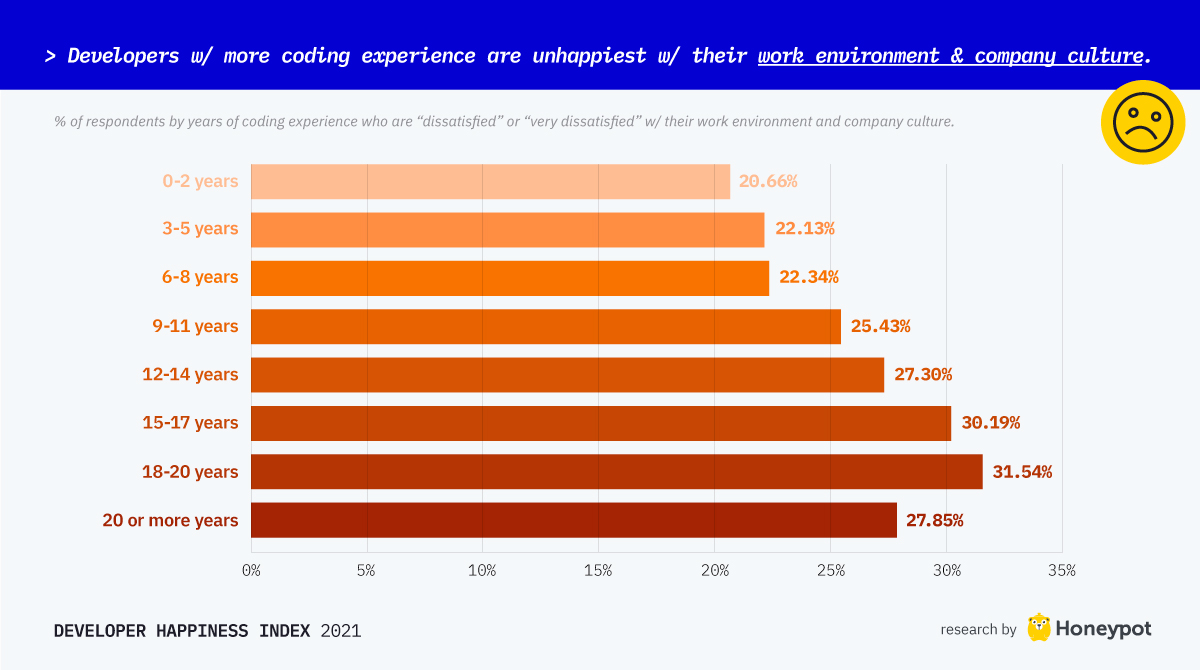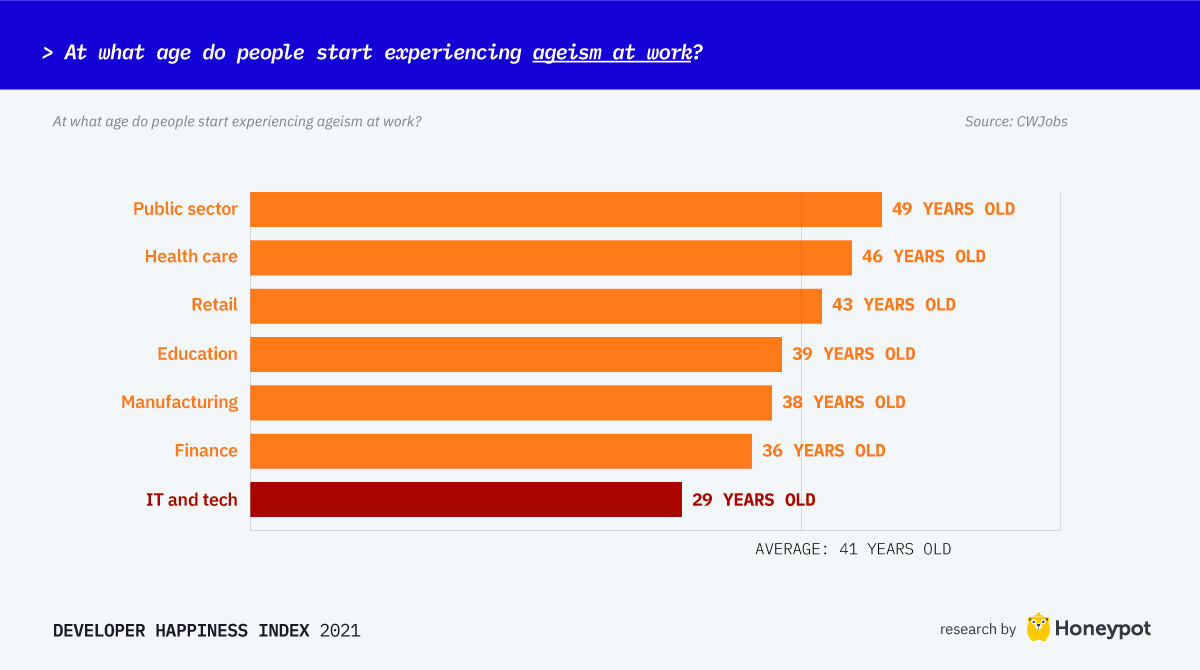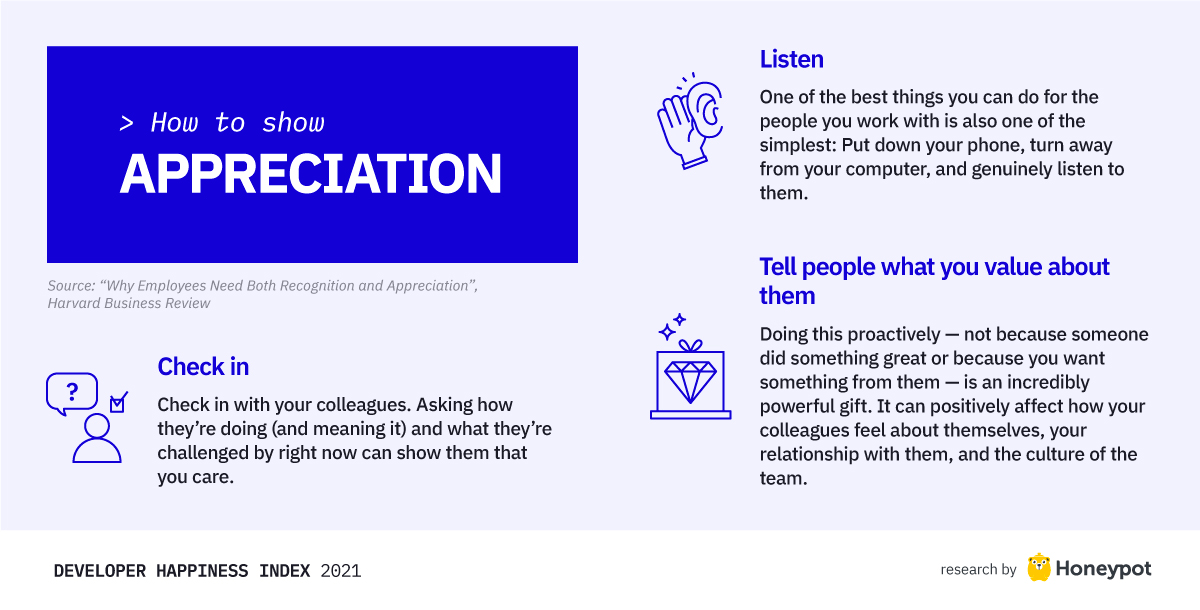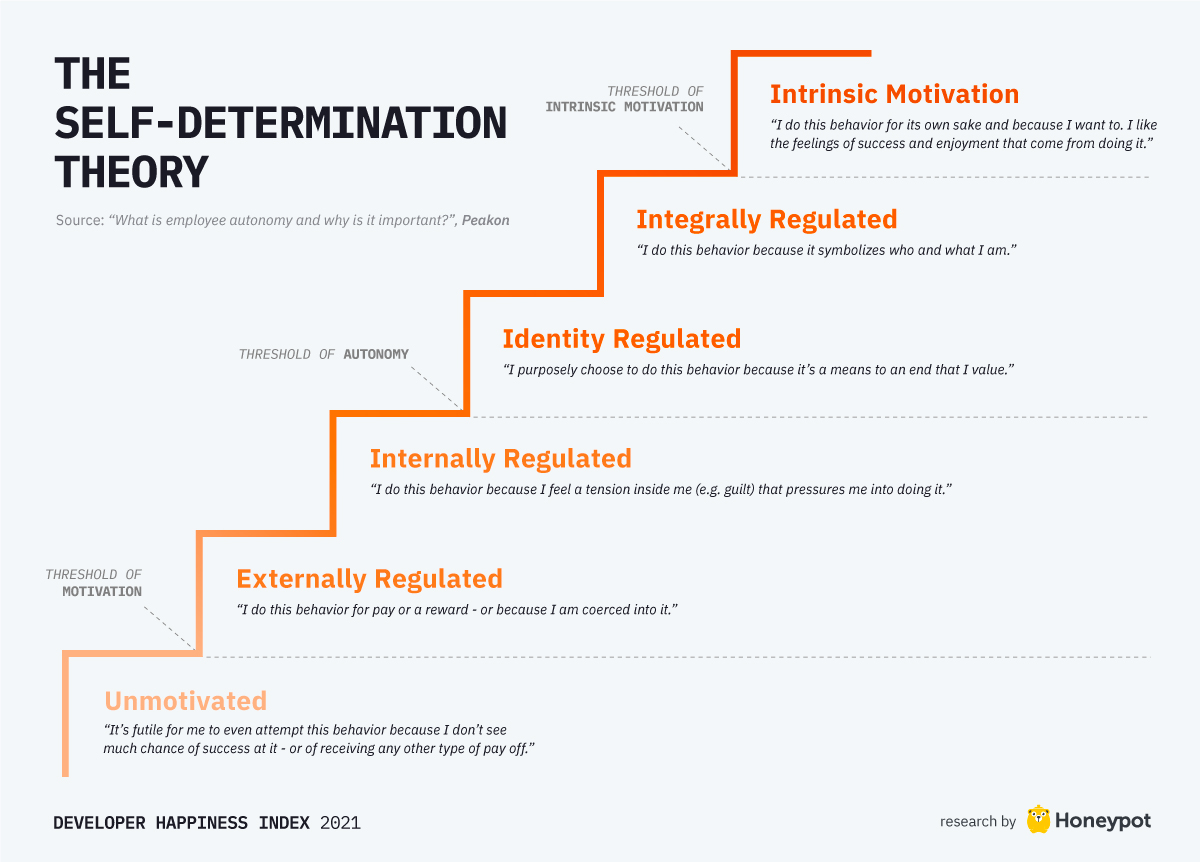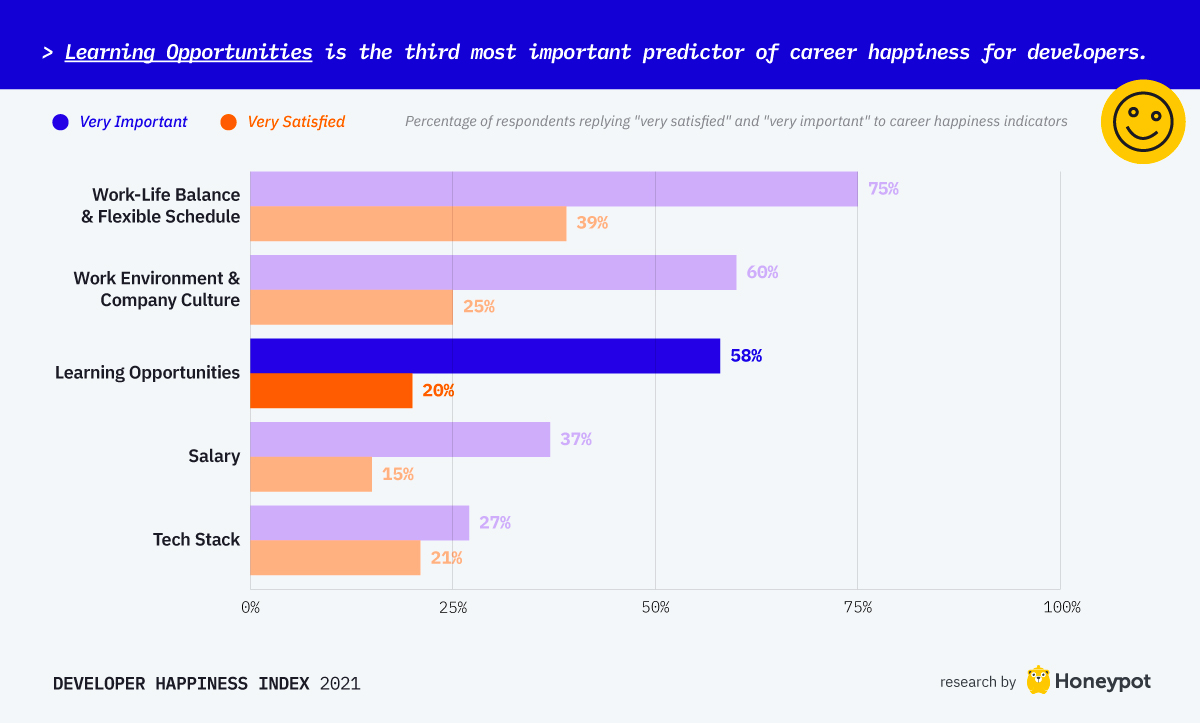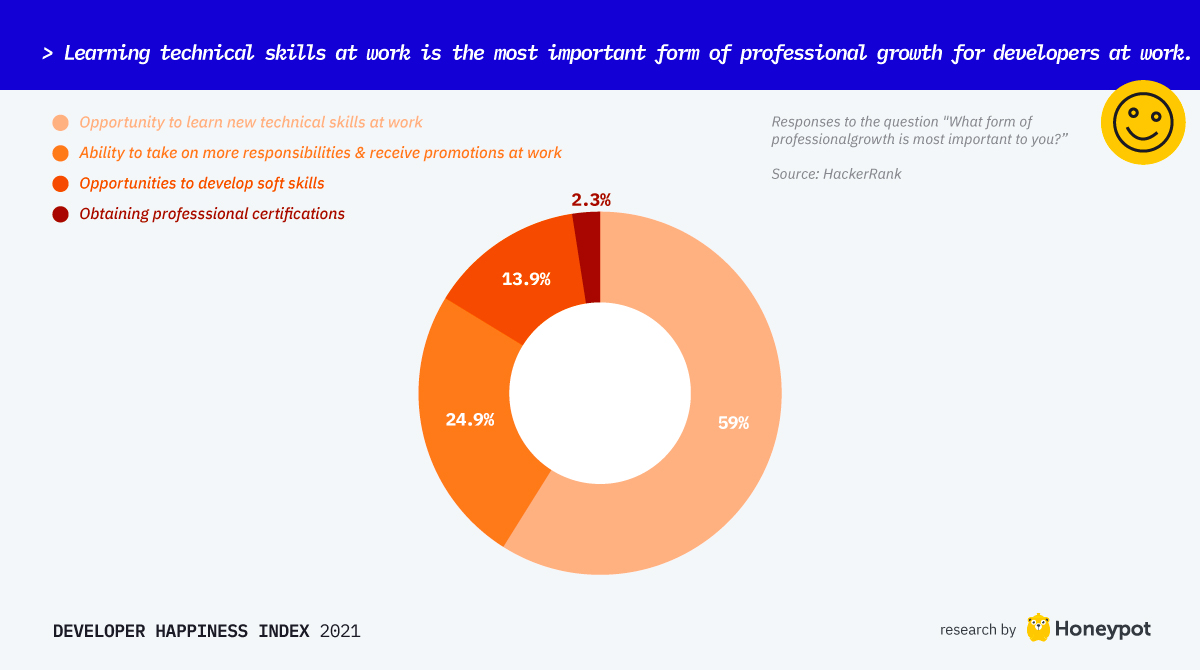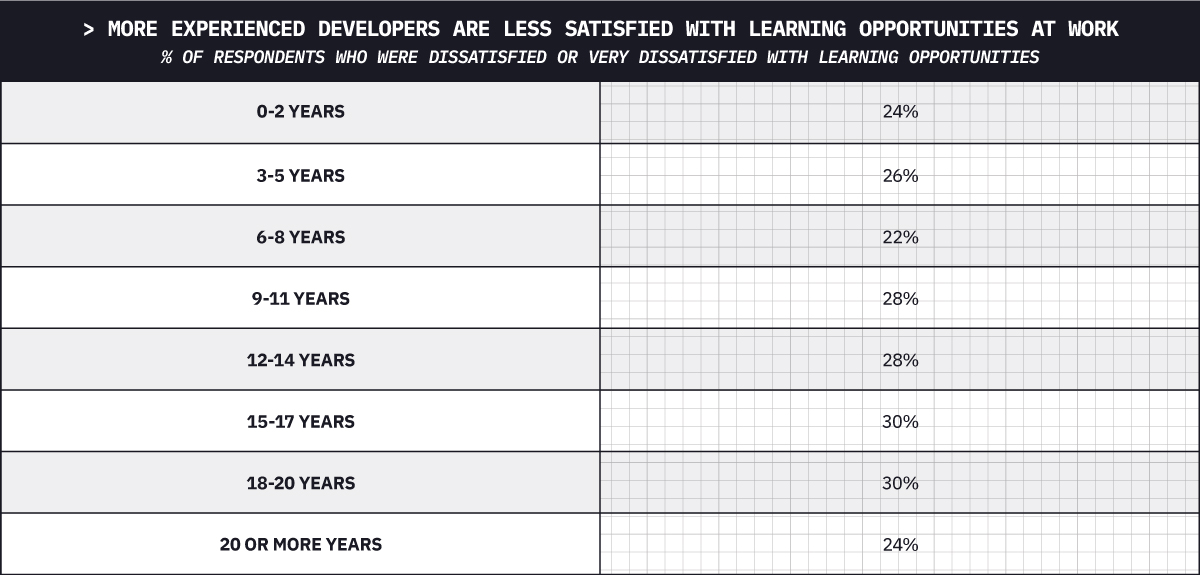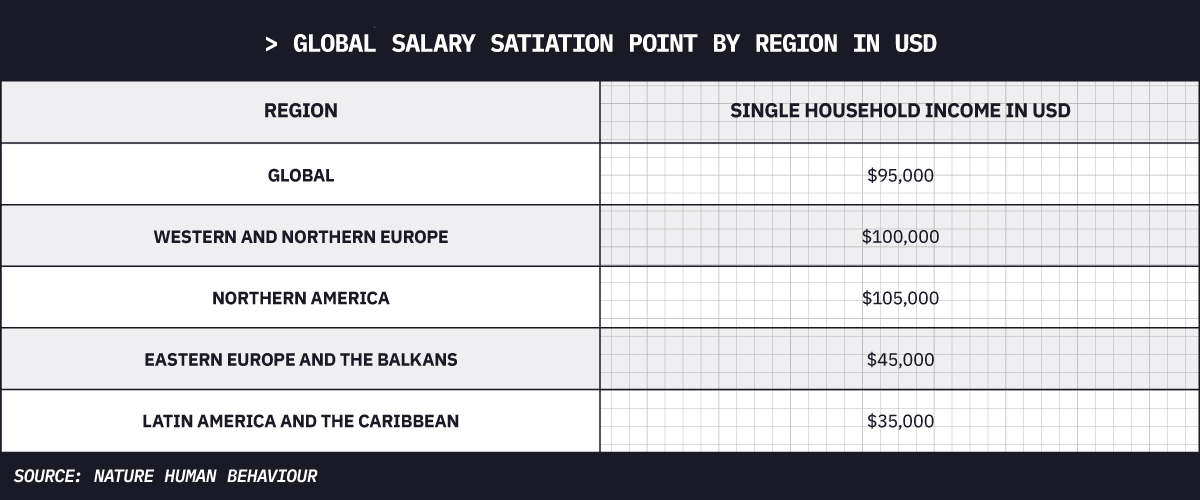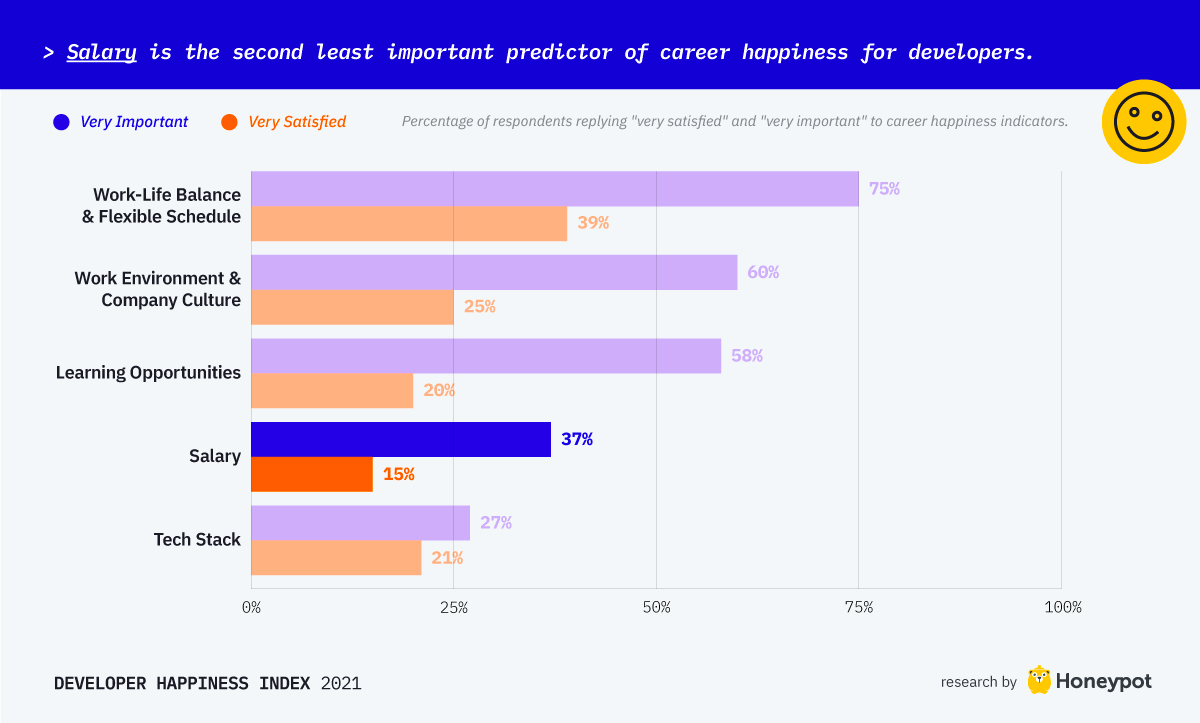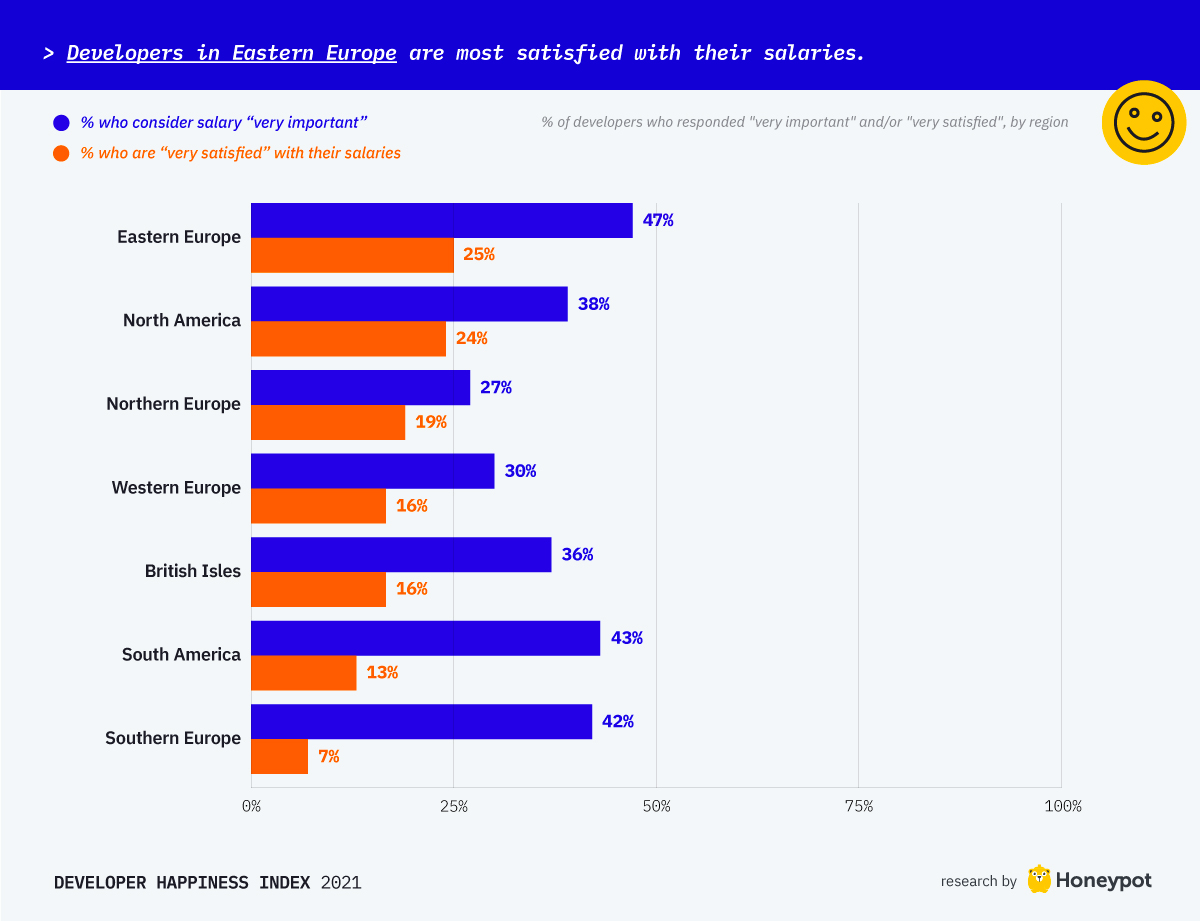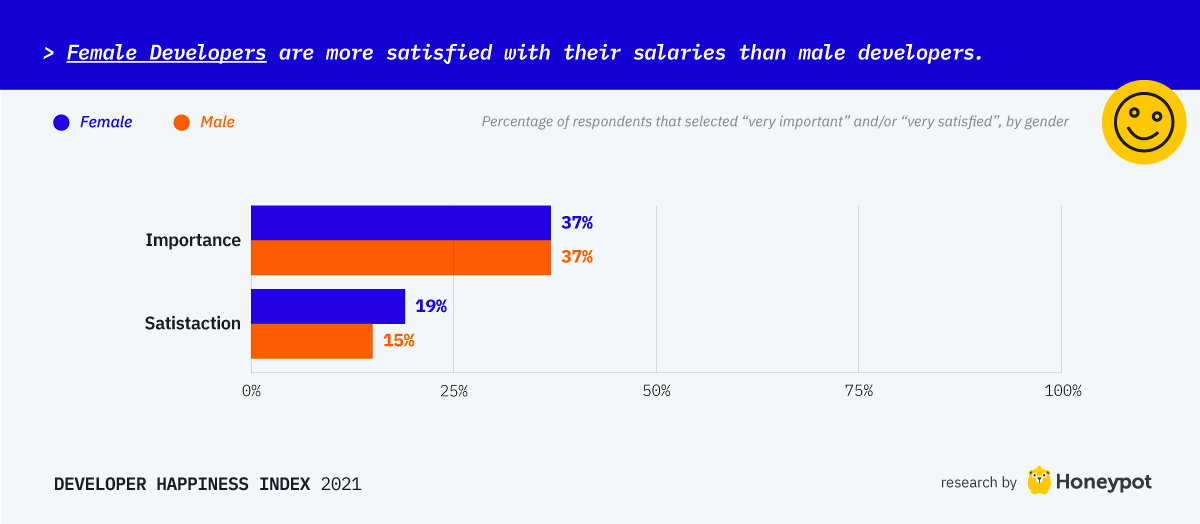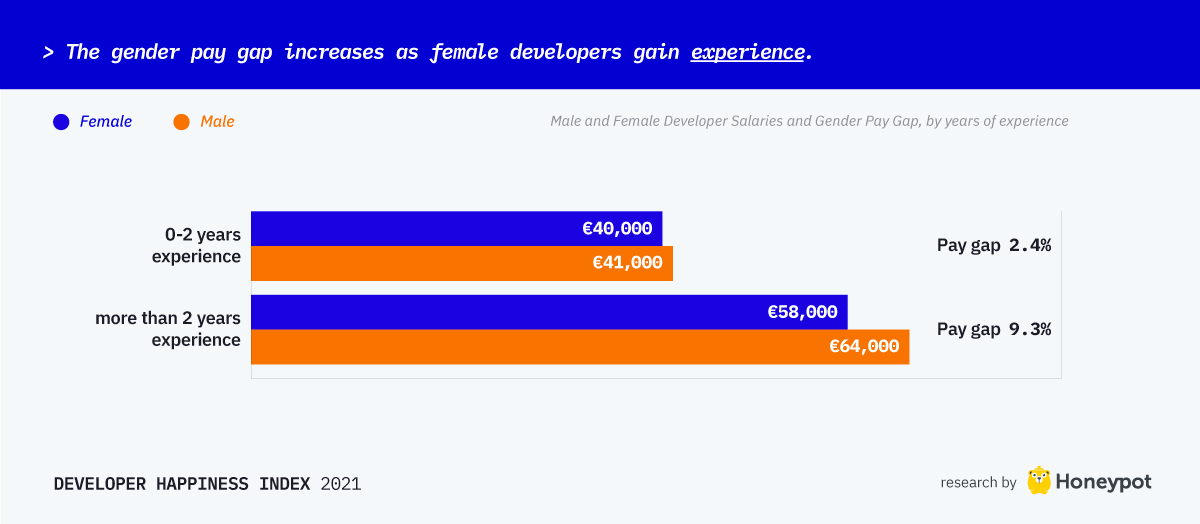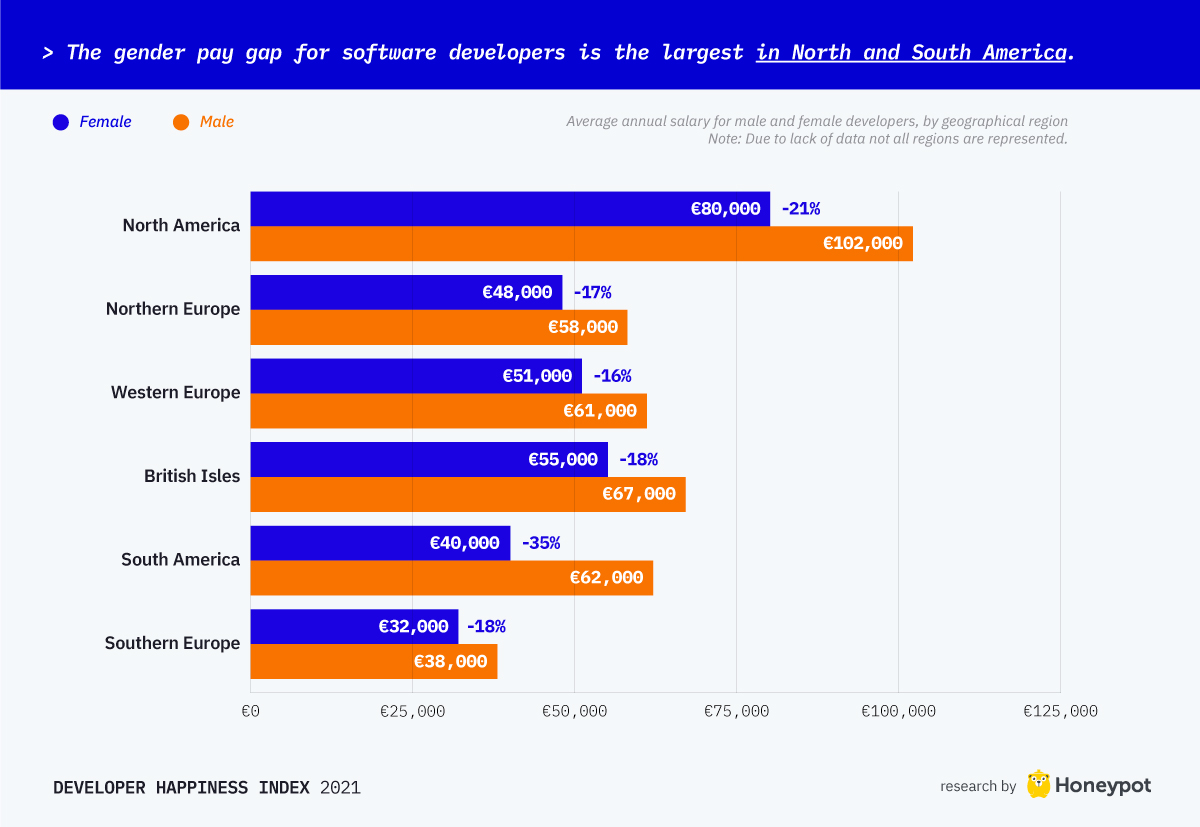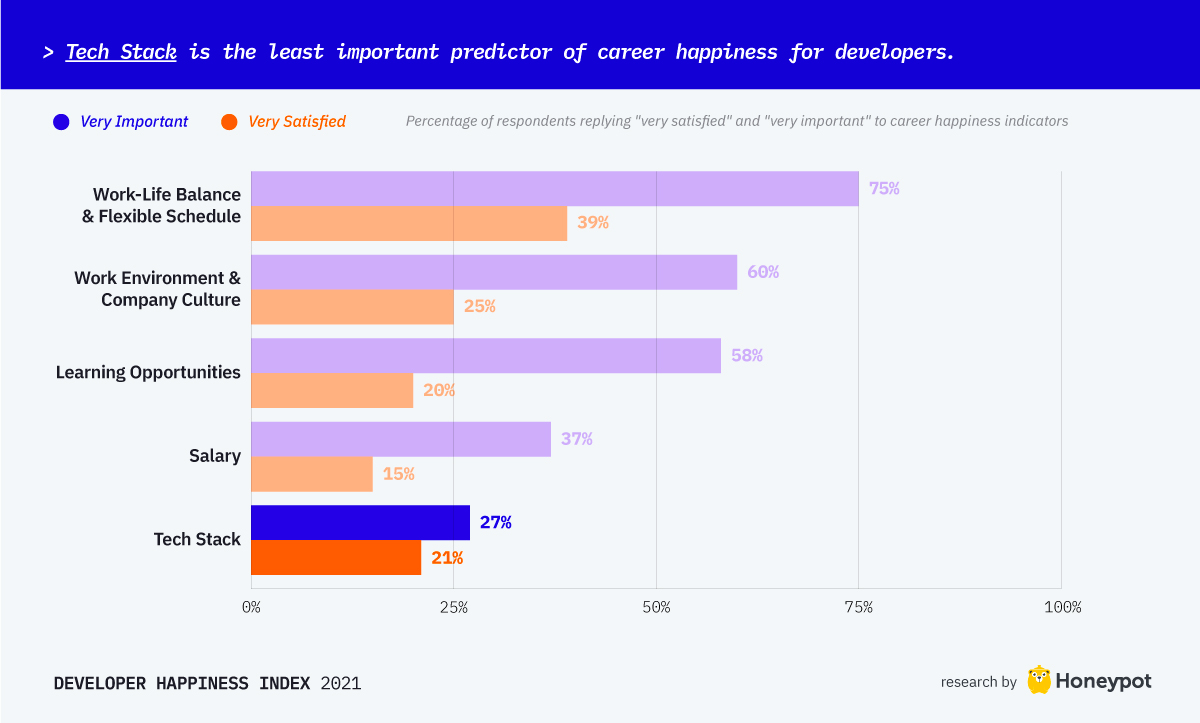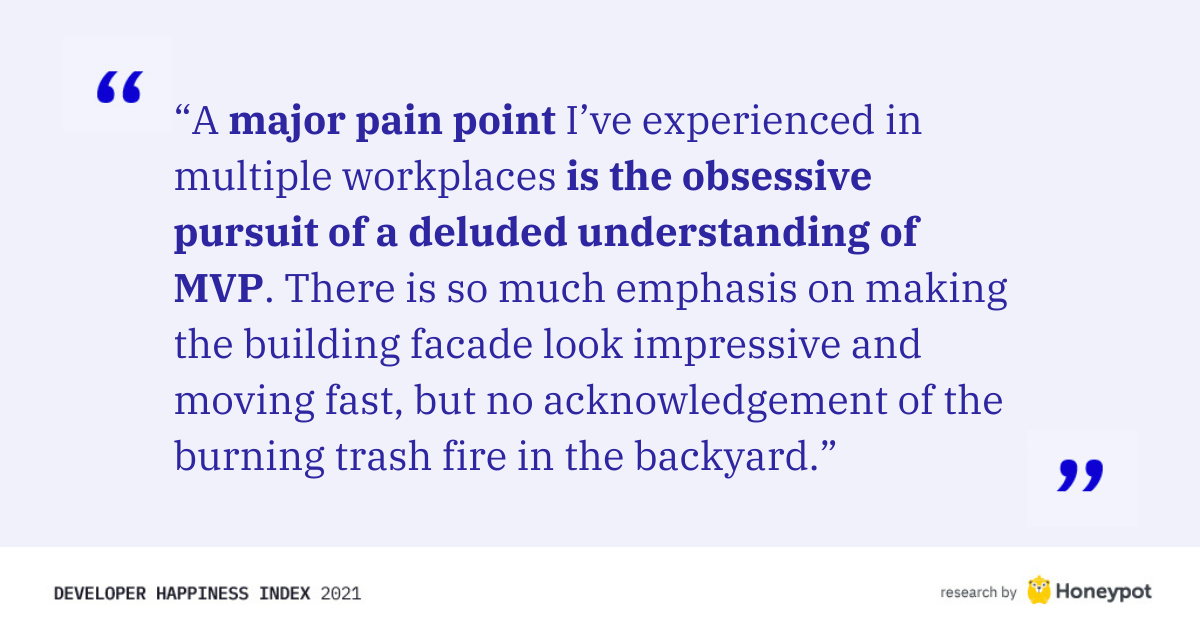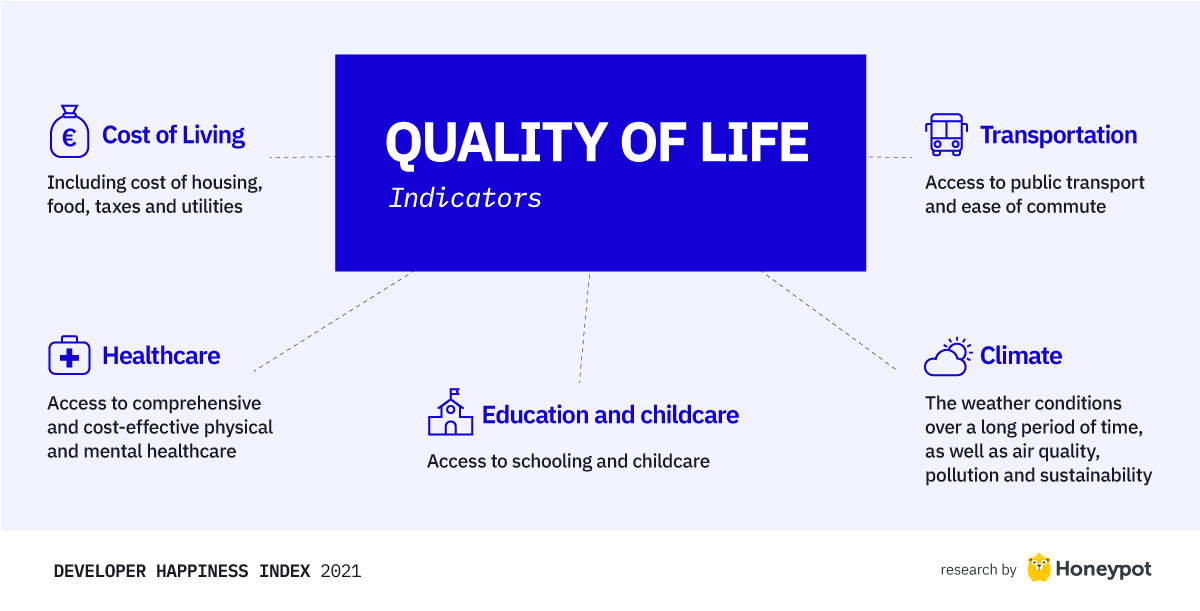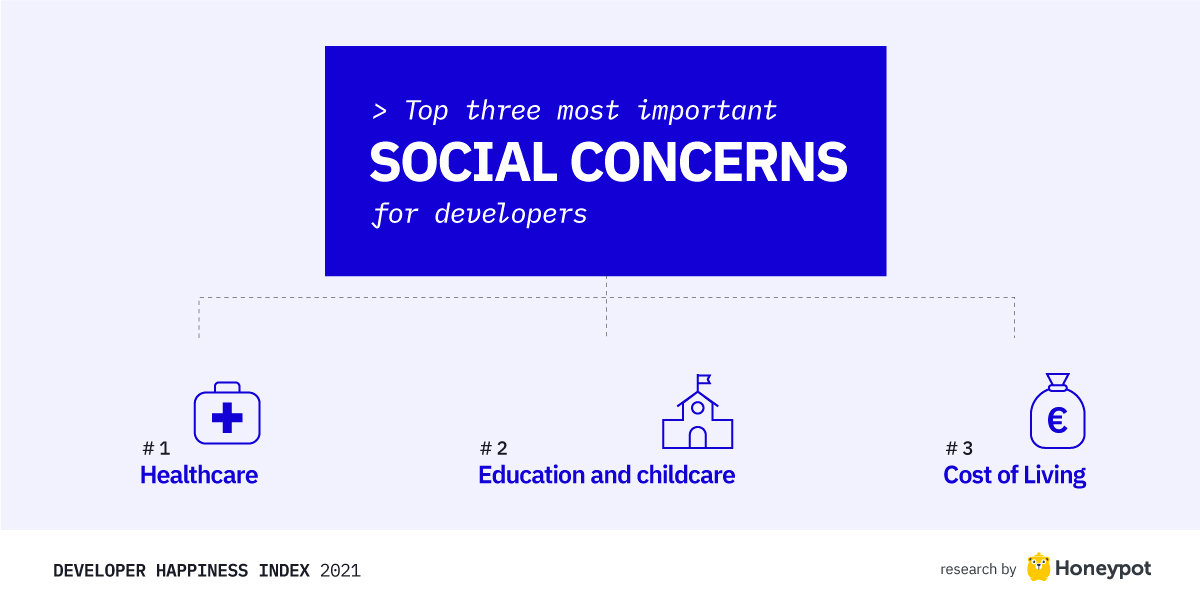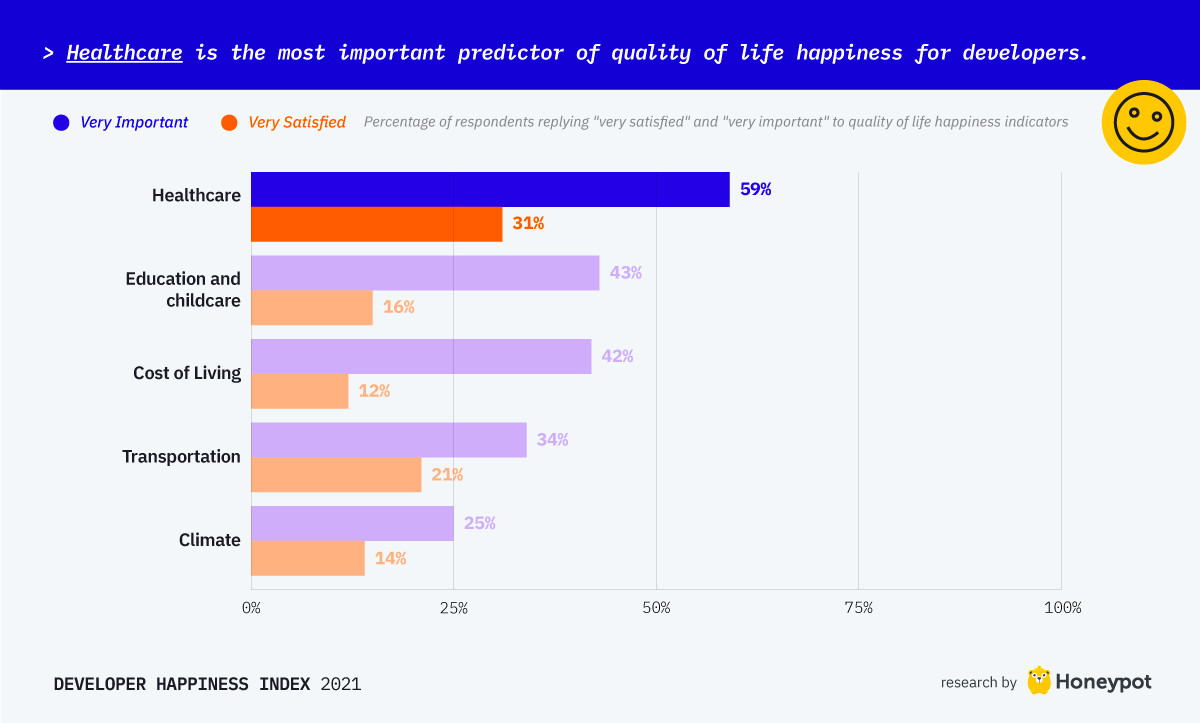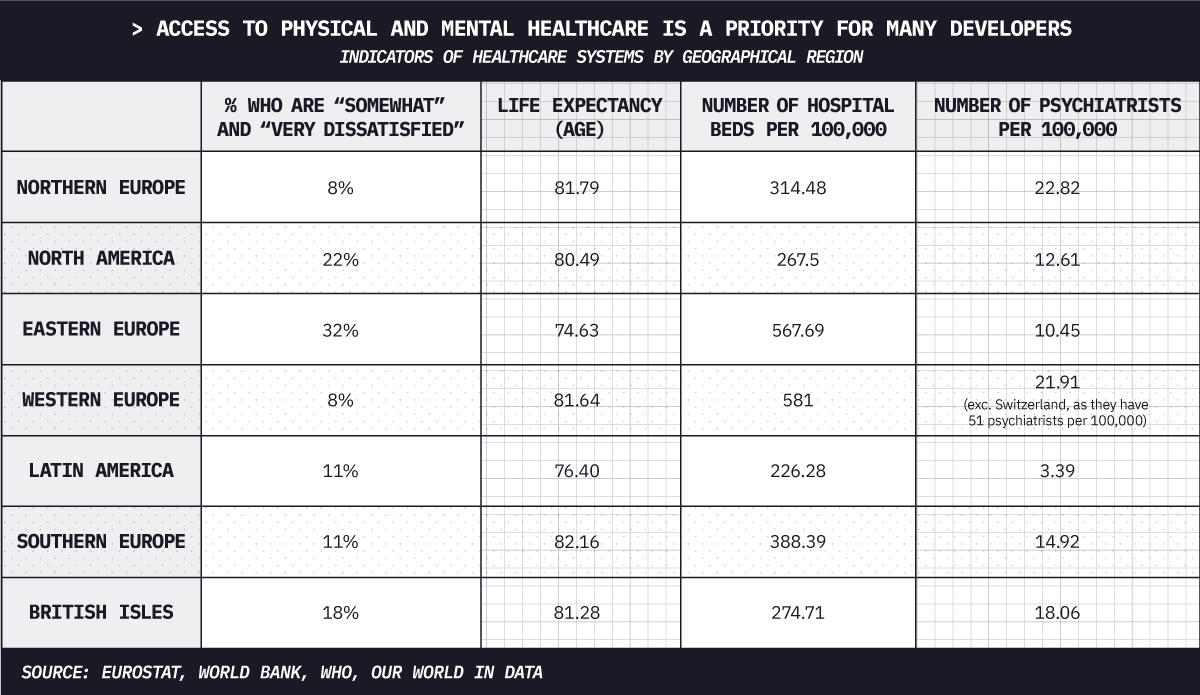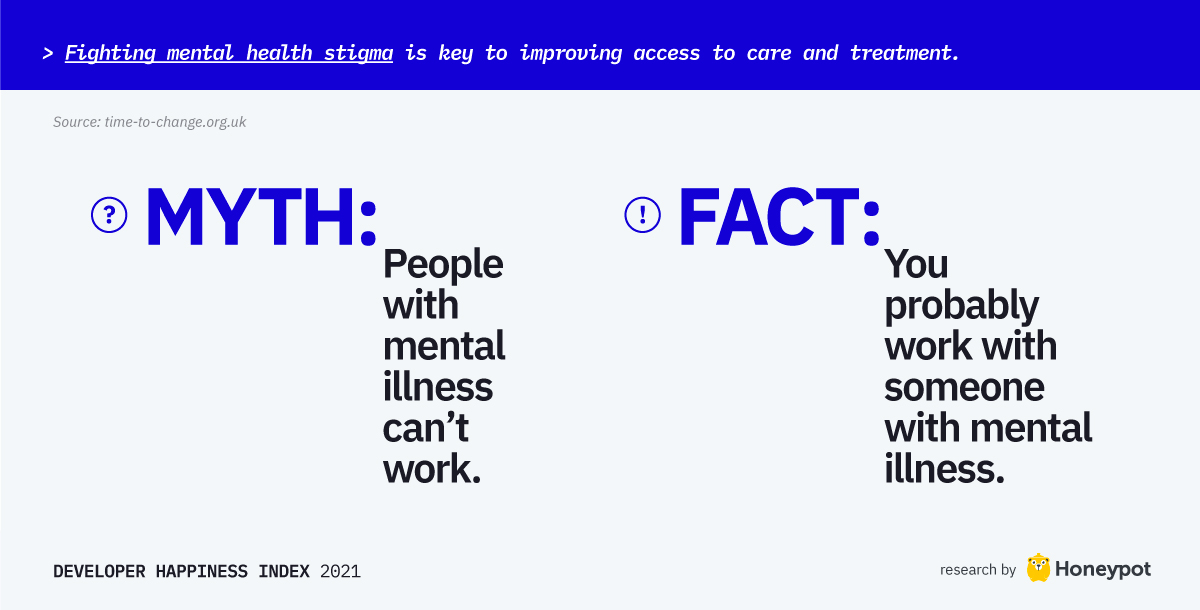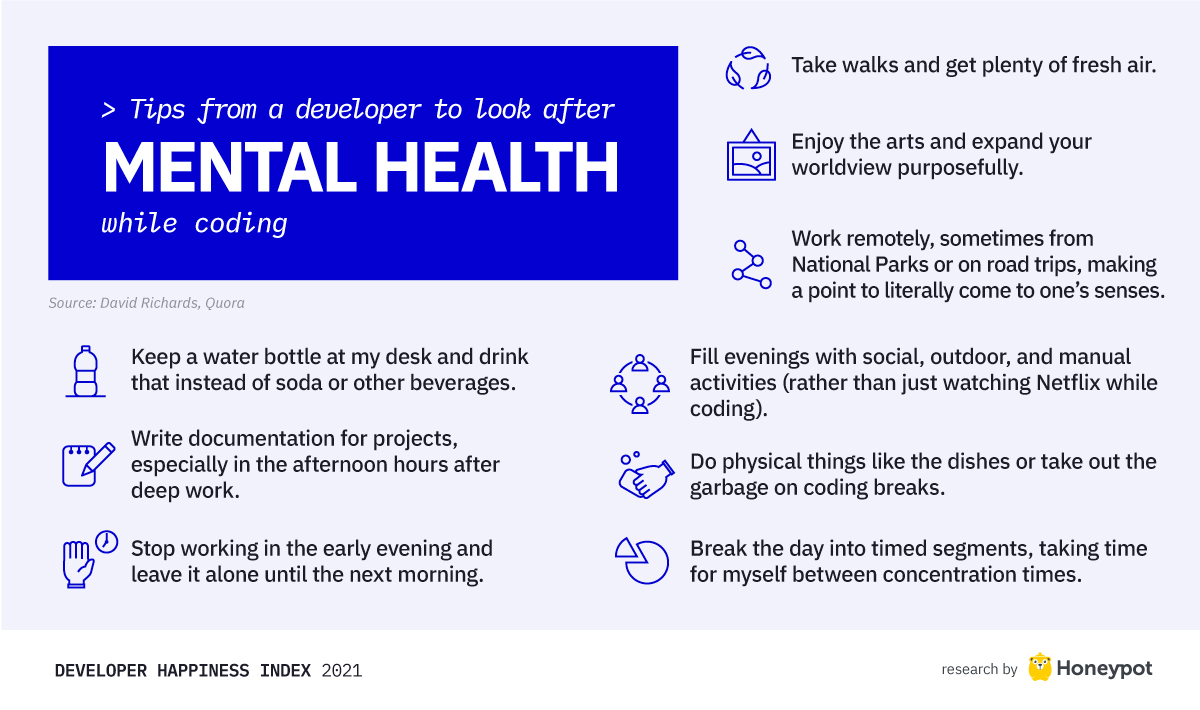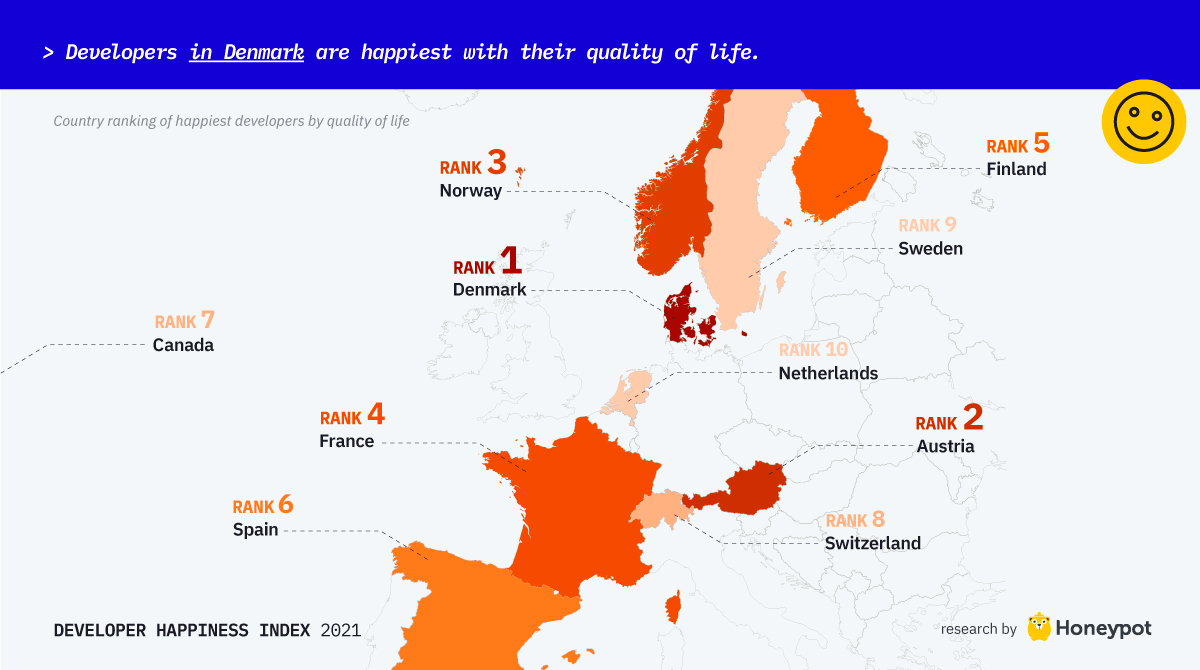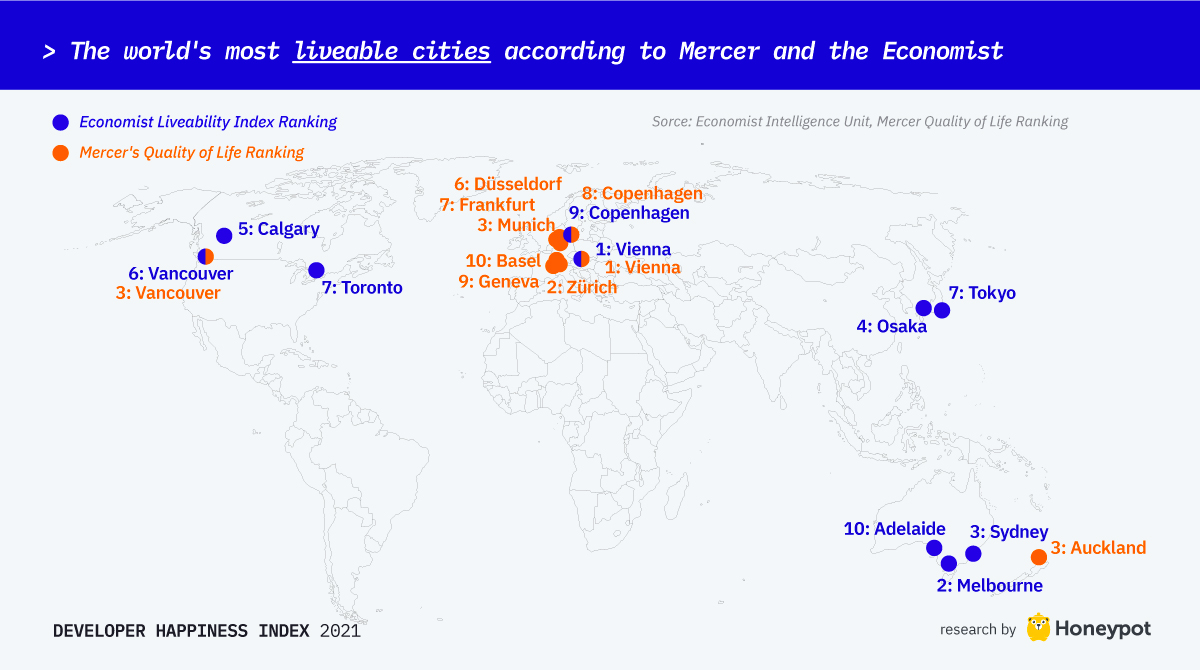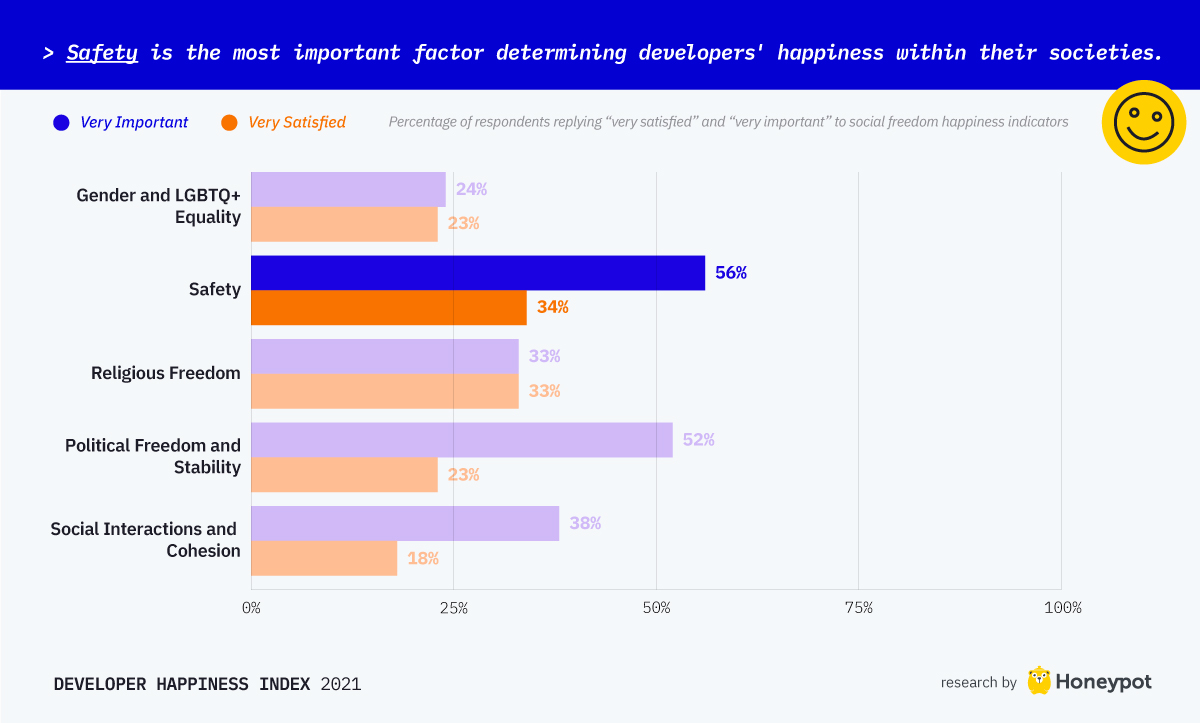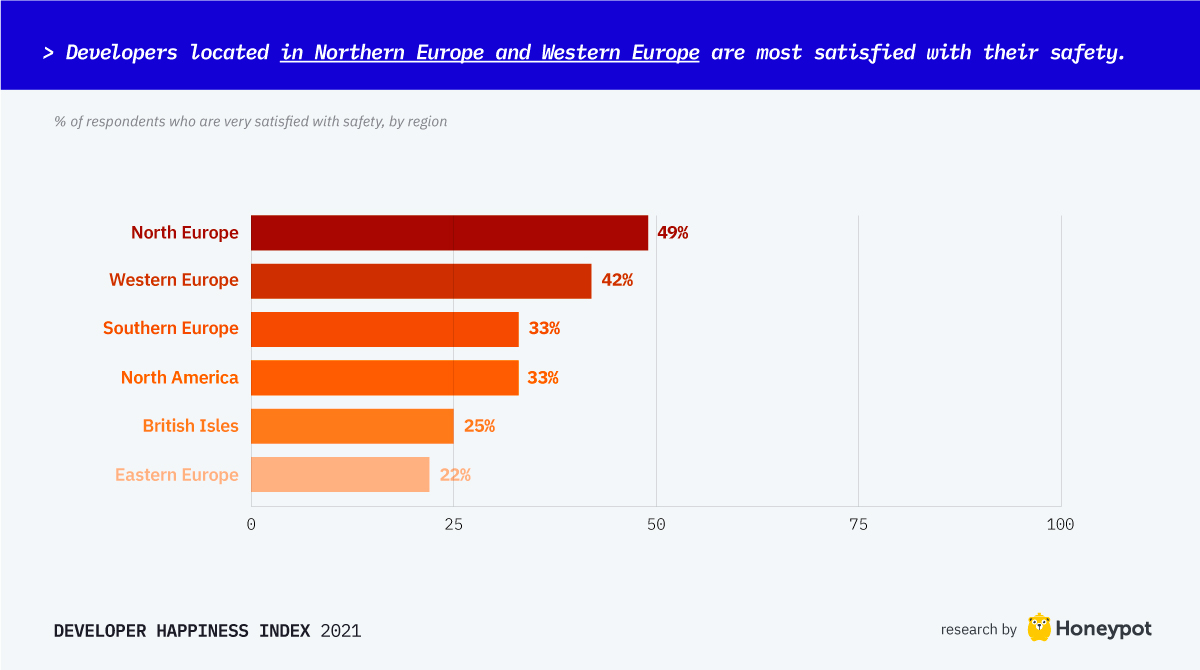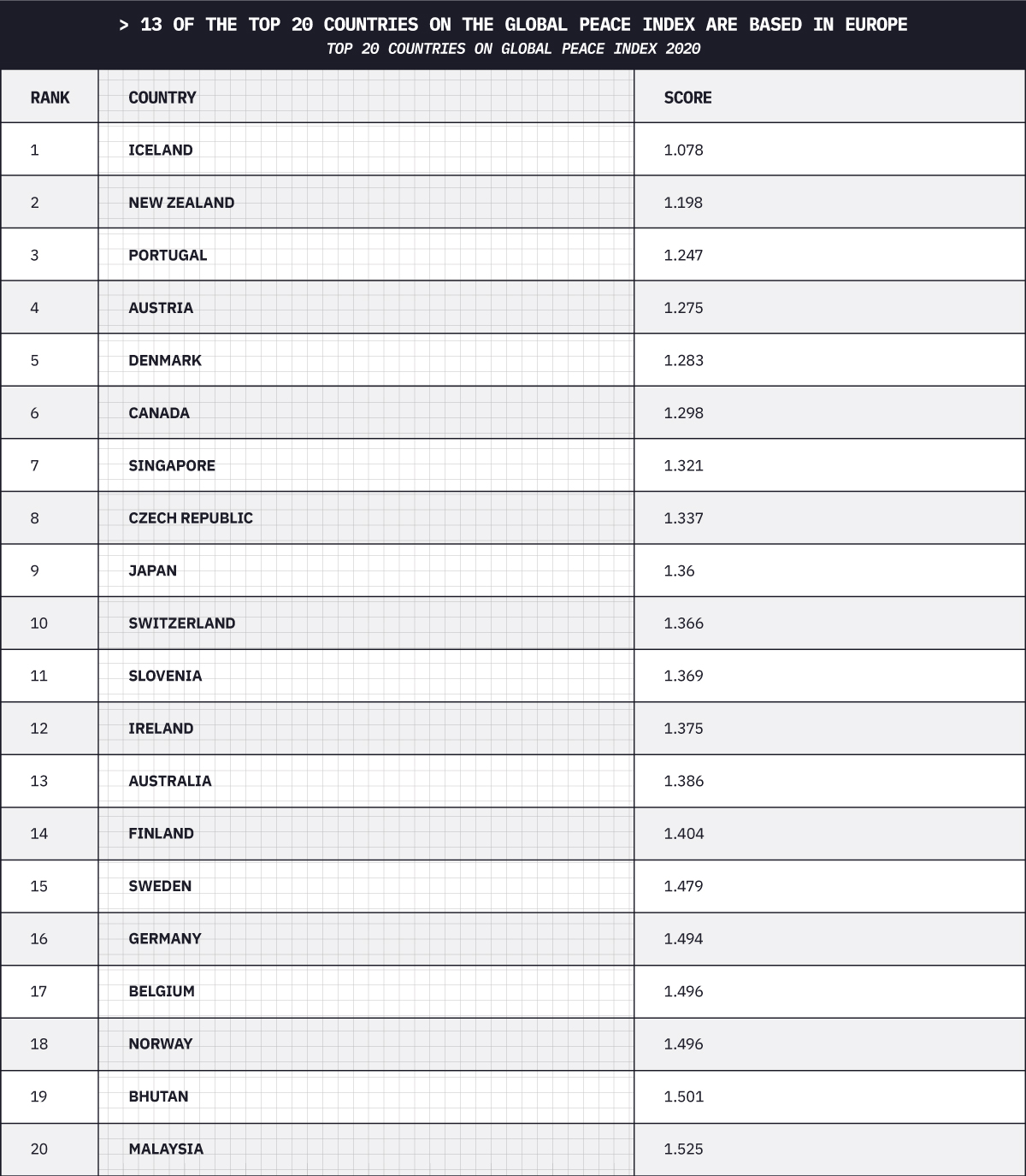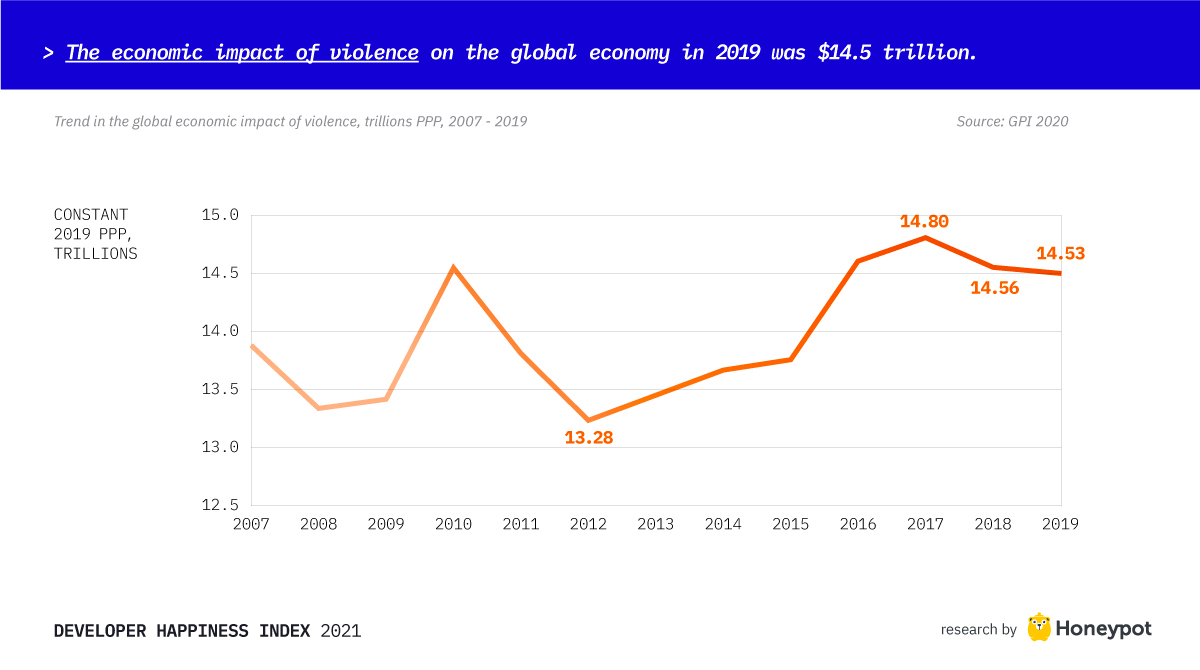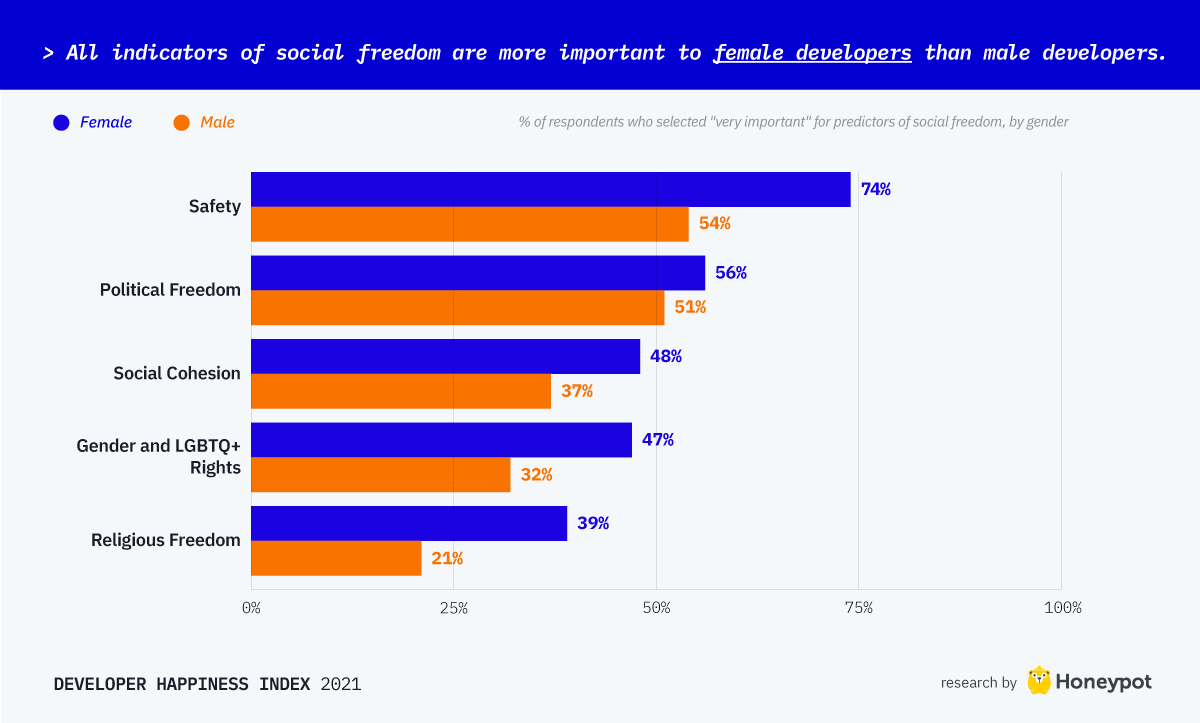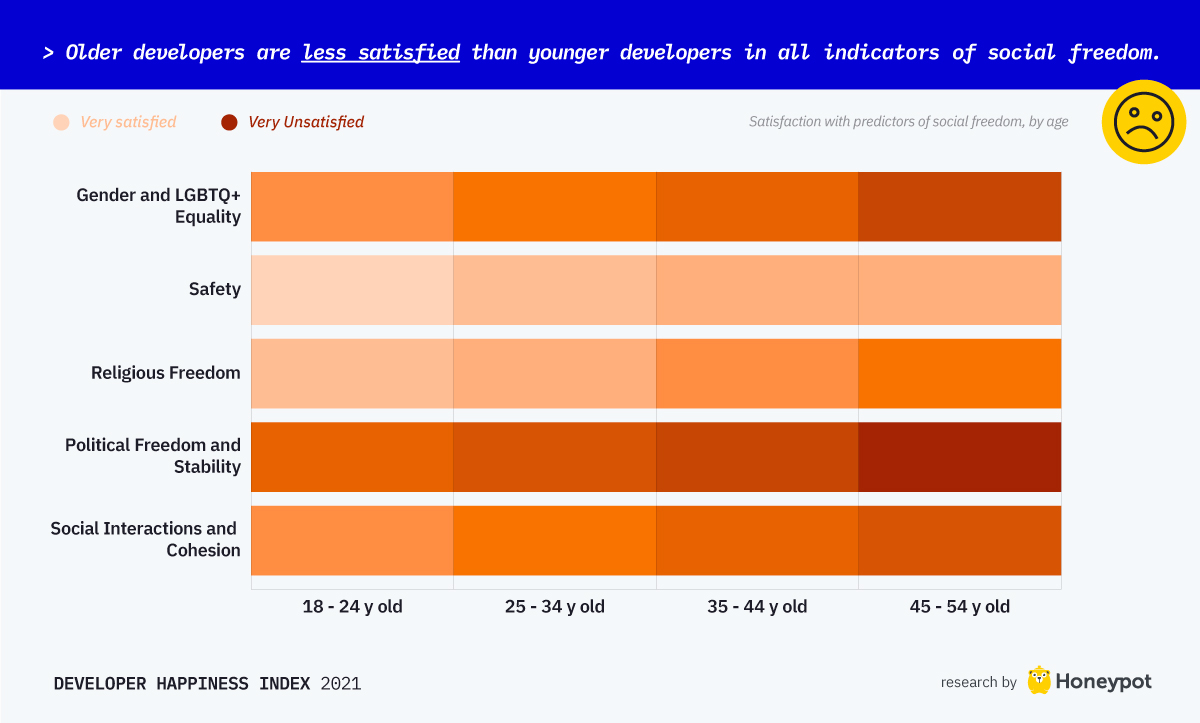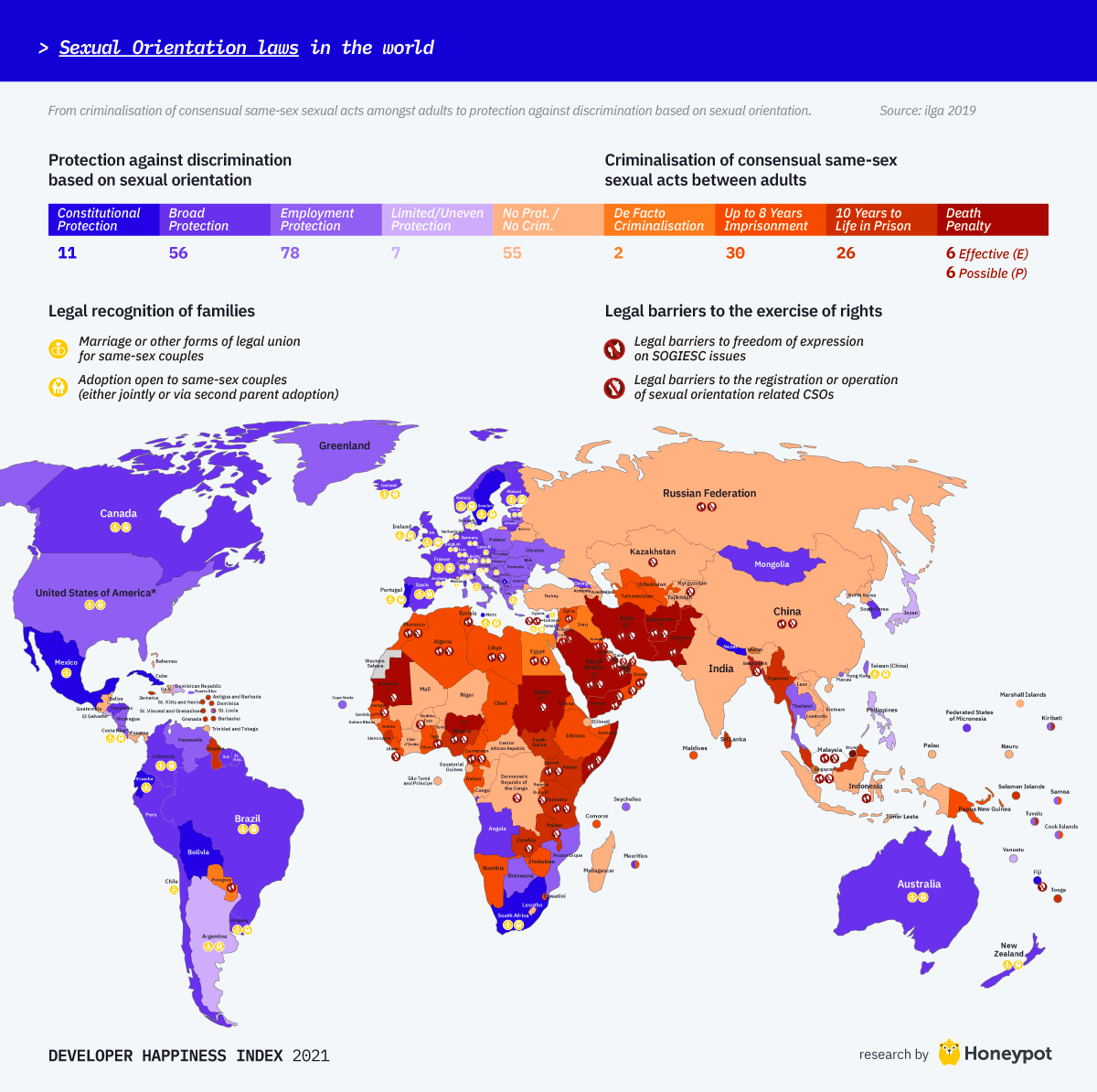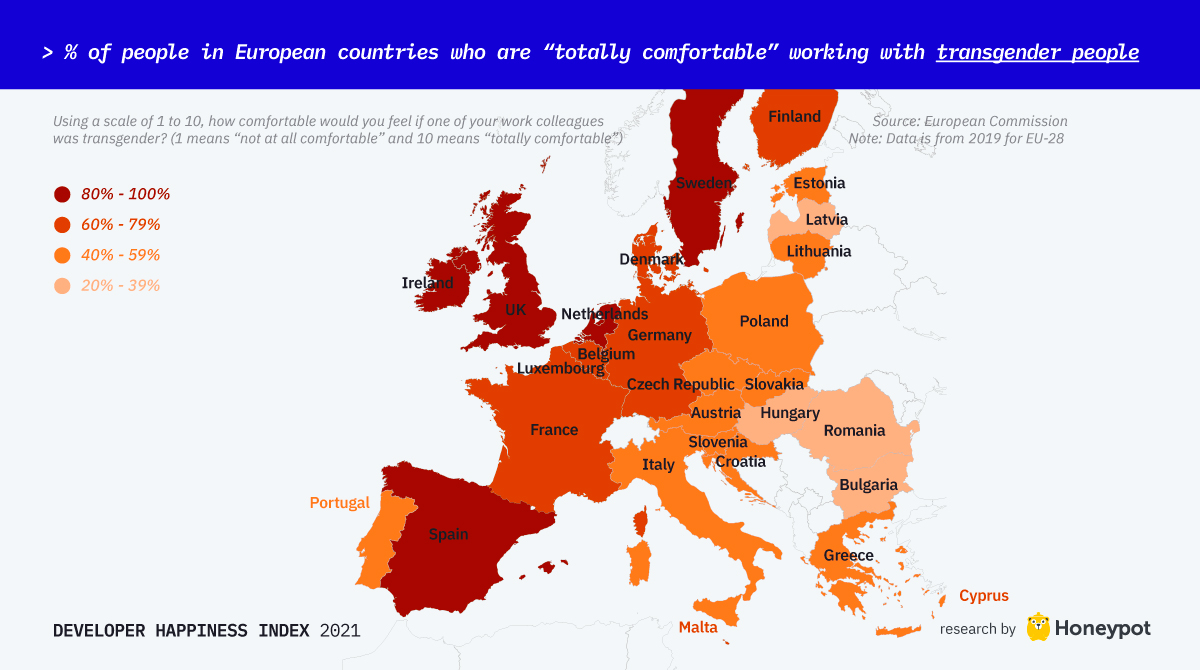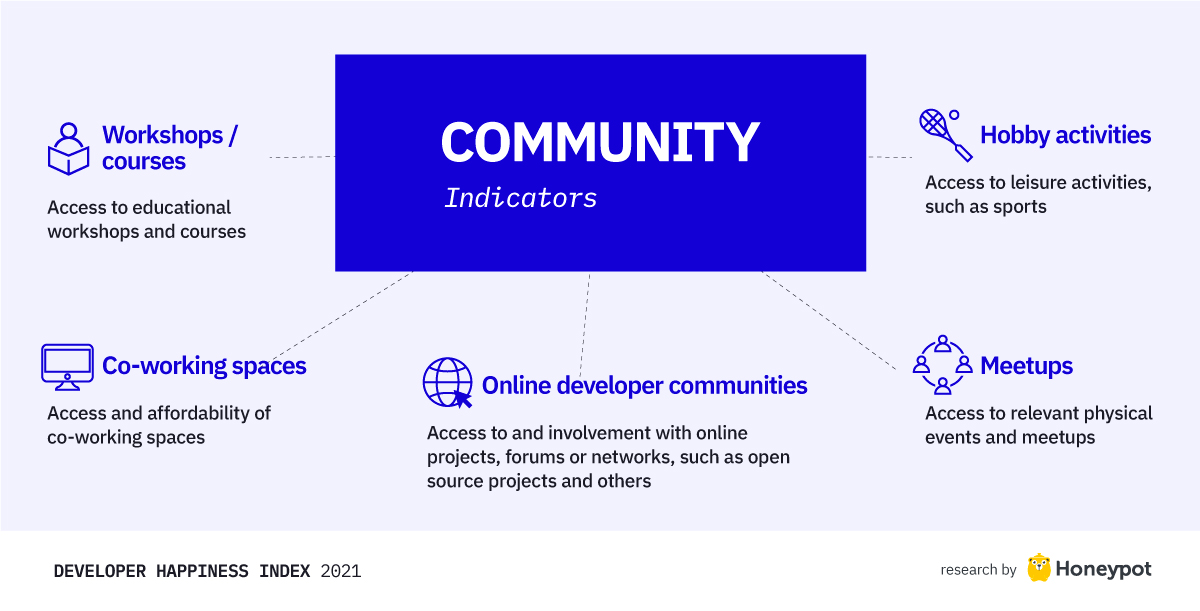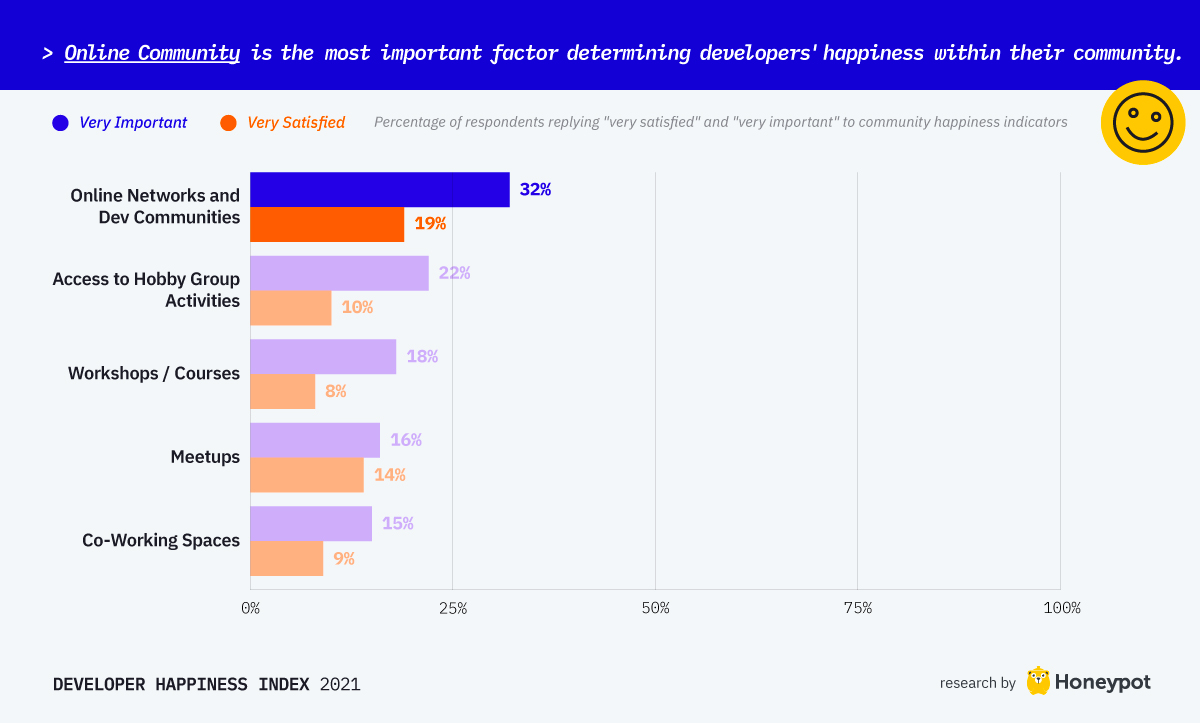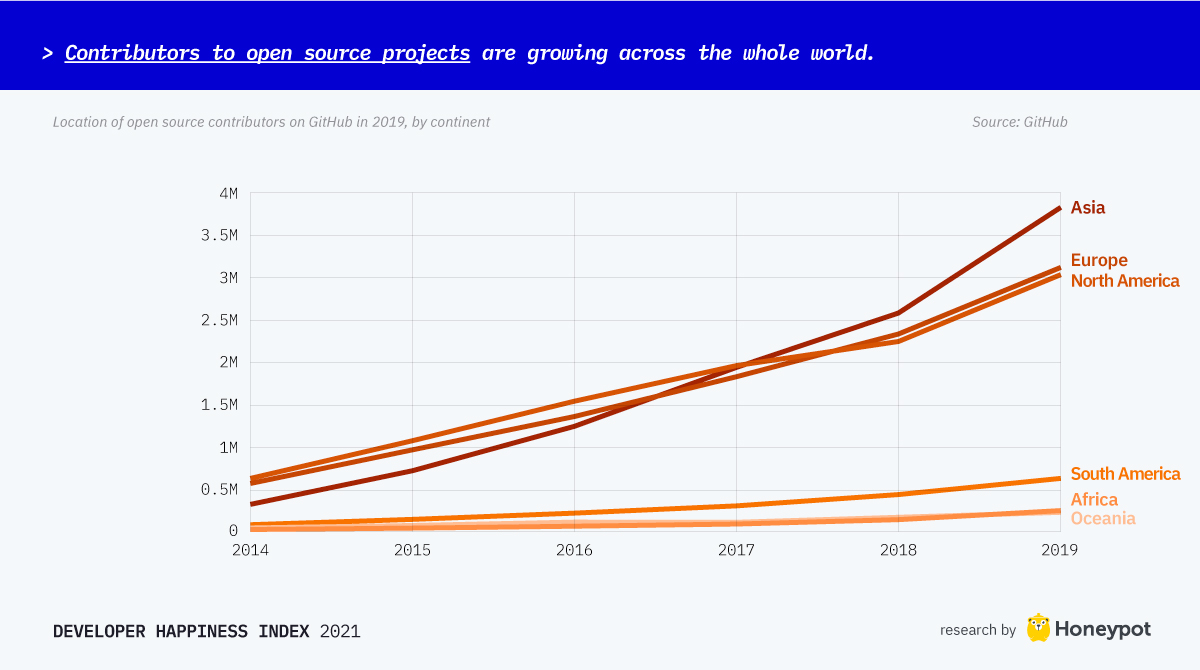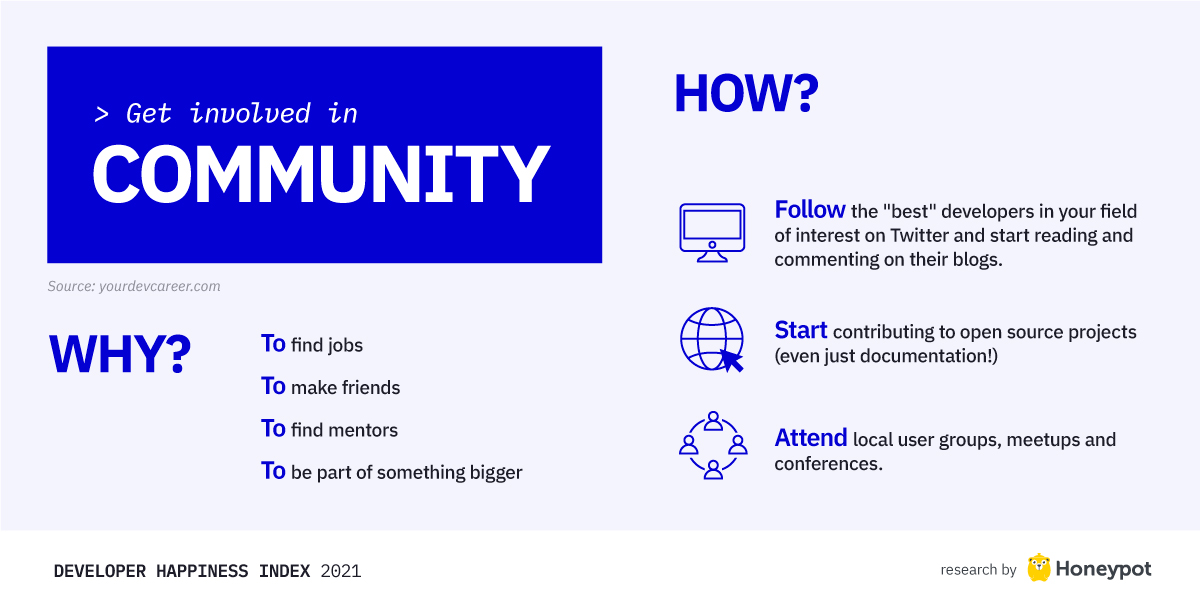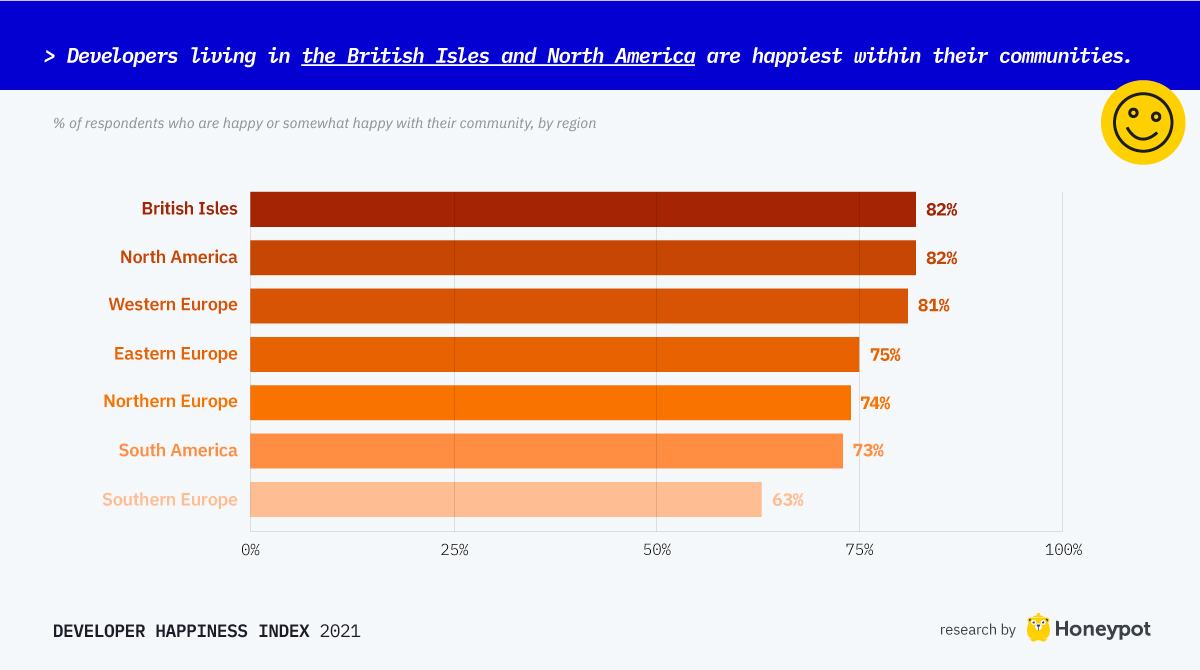The average developer rates their happiness at 61 out of a potential 100 points, compared to the average OECD citizen who rates their happiness at 65. Hard to say if the comparison is fair, given the different data sets, but it suggests developers are not yet prioritizing their happiness. Of course, there are huge variations in how developers evaluate their happiness depending on where they are located. Globally, Northern and Western European countries rank as the countries with the happiest developers. Relationships and personal autonomy are also important factors moderating happiness. According to the WHR “Nordic citizens experience a high sense of autonomy and freedom, as well as high levels of social trust towards each other, which play an important role in determining life satisfaction.” The Netherlands, the country which takes the third spot on our rankings, tops OECD countries for high life satisfaction among young people. The education system focuses on developing autonomy and self-determination rather than obedience, resulting in happier people and better outcomes. Stability and well-functioning institutions combined with personal freedom, safety, and autonomy seem to be the recipe that determines happiness in the countries that top both our index and the WHR. We asked developers to evaluate 20 indicators across four categories by importance and then by satisfaction to derive self-evaluated happiness. Career indicators ranked highly in importance. Three of the top five indicators of happiness are related to developers’ careers — work life balance, learning opportunities, and work environment. It should be noted, however, that while the same scales were used, we did not explicitly ask developers to compare indicators across categories. According to Harvard Business Review, employed people are happier and have less negative emotional experiences in their day to day lives. Further, non-monetary aspects of employment, such as social status, social relations, daily structure and goal achievement, are key drivers of well-being. Since we spend a lot of our lives working, it is inevitable that work plays a key role in shaping our levels of happiness. From our analysis, we found that for developers, happy jobs are remarkably similar to happy countries: stable leadership, autonomy , and a sense of self-determination and achievement. Healthcare and safety also ranked very highly as indicators of happiness amongst developers. Health and happiness are self-reinforcing, happier people tend to be healthier. Across segments, developer happiness remained fairly constant, be it by age, gender or coding experience. As developers get older and gain more experience, they grow slightly less happy. Female developers are slightly more happy than male developers, though again there is only a small difference between these two groups.
Work-life balance is the most important predictor of developer career happiness. Developers in Northern Europe are most satisfied with their work-life balance — they also work the shortest hours. Satisfaction with work-life balance increases in trusting environments, where developers feel they have flexibility in their schedules. Older developers are less satisfied with working environments and company culture and begin to face ageism from the age of 29. Women are more satisfied than men with their salaries, though a large gender pay gap exists. The pay gap is largest in North and South America. The happiest developers at work live in the Scandinavian countries of Northern Europe. The unhappiest at work are based in Southern Europe. Companies with high employee happiness outperform their peers.
We all want to live rich and meaningful lives — at work and home — without sacrificing important aspects of either. When the balance is skewed, it can affect one’s physical and mental well-being, and that’s when things start to fall apart both inside and outside of work. Work-life balance is the most important indicator for developer happiness at work, regardless of experience, age, gender, position, and region. 75% of developers cited this factor as “very important,” and 39% consider themselves “very satisfied”. More than half of developers located in the Scandinavian and Nordic countries of Northern Europe are very satisfied with their work-life balance, higher than anywhere else in the world. They also enjoy shorter working hours on average than developers in all other regions (when measured by % working a 40 – 60 hour week). The positive results from Scandinavia’s six-hour workdays or four-day-weeks aren’t isolated to Europe; practices like these have been trialed in Chinese call centers and Microsoft offices in Japan with similar indications of increased productivity. Scandinavia’s success in promoting work-life balance is powered by the high amount of trust between people, a culture of collaboration, and preference for consensus-based decisions, which leads to greater feelings of autonomy. Countries in Southern Europe work longer hours over longer workdays and have lower salaries compared to countries in Western and Northern Europe. In 2016, Spain’s employment minister called for companies to allow their employees to finish their workday at 6 p.m. rather than the long-held 8 p.m., which was no longer punctuated by long breaks. Remote work is often cited as a means to improve work-life balance. In our open comments section, remote work is mentioned nearly 200 times, particularly as a solution for noisy open offices and long commute times. COVID-19 has pushed many teams into remote situations and over time we will see if this does indeed impact happiness. There’s often the temptation to make quick changes to improve work-life balance, but companies need to commit time and effort for policies to be successful. A 2019 Harvard Business Review article summarised the traps of implementing policies that are not well thought through:
Flexibility does not always translate into a better work-life balance. Since employees can communicate with colleagues through their devices at any time, remote workers often experience high work-intensity and reduced autonomy. This constant connectivity can blur the boundaries between work and non-work activities.
Paid family leave or childcare support can raise perceptions of unfairness in the workforce. Such policies are typically reserved for workers with caregiving responsibilities. They are much less accessible to workers who desire the same level of work-life balance but lack urgent family responsibilities. The majority of employees who do have access to flexible work arrangements are reluctant to use them. Many fear that doing so shows low work-commitment and will harm their career.
To maintain happy developers, it is essential to not only promote a healthy work-life balance but to live it. Employers need to train supervisors to be positive role models and offer practical and emotional support in topics related to work-life balance. Jump into any Reddit or Quora thread and you will find plenty of vocal developers sharing their gripes with their work environments and company cultures. After all, 60% of them consider company culture to be very important, while only 25% are very satisfied, and the level of satisfaction decreases as the developer gains more experience. Creating a healthy work environment and company culture, which is relevant to all age groups, is an essential investment in any business. It reduces employee turnover, improves productivity and motivation, and naturally contributes to an overall sense of well-being and happiness among employees. But how do you go about creating an environment and culture within which developers can thrive? In their words, it’s pretty simple: trust them, appreciate them and listen to them – and abandon the open-office structure, too. In our survey, we posed the following question: What else, if anything, contributes to your overall happiness as a developer? From the 2000+ responses, most centered around relationships with teammates and management, recognition and appreciation, autonomy, meaningful work, and the general office environment. Developers say they want to be part of “passionate,” “diverse,” “cooperative,” and “supportive” teams. They expect responsibility to be shared, team members, to be open to knowledge-sharing, and product colleagues to be process-driven and focused. Engineering’s relationship with Product can fuel productive, creative solutions or developers can see it as a major obstacle in building stable and valuable products. Collective responsibility and high trust – not just amongst engineers, but among the broader team – is desired by many: Among engineering teams, respondents crave mentorship and want to create open cultures of sharing:
Management
Management plays a significant role in developer happiness at work. Developers want managers who respect clean code practices and value coding as a creative process: Many mention a desire to work for leaders who are committed to a bigger vision, who care, and who set a clear direction: The impact of management should not be overlooked. Developers state that they would “rather work for a good manager but use a bad tech stack” than vice versa; “poor management can make people change jobs or give up altogether,” and “the pay is decent, the tech stack is lacking, but my manager does not inspire or promote progress, so I am leaving.”
Recognition
In a recent Glassdoor survey, 53% of people said feeling more appreciation from their boss would help them stay longer at their company, and developers feel the same: There is a difference, however, between recognition and appreciation. Recognition is conditional, finite and in the past – we are praised for specific work we have accomplished. On the other hand, appreciation is about acknowledging one’s inherent value – not what a person has done, but who they are.
Autonomy and Trust
In an LSE analysis of 51 experimental studies of financial incentives, researchers found overwhelming evidence that these incentives may actually reduce an employee’s natural desire to complete a task and derive pleasure from doing so. Counterintuitive, right? Not for Dan Pink and others, who for years have promoted intrinsic motivators – like autonomy – over extrinsic motivators, especially for people working on complex and creative tasks. And autonomy is connected not just to happiness, but also to motivation. The Self-Determination Theory shows that motivation exists on a spectrum that is largely moderated by autonomy and that higher degrees of motivation can only exist in an autonomous state. This fits with Dan Pink’s already cited Autonomy-Mastery-Purpose model, where the purpose is the need to work towards something meaningful and bigger than oneself. Many developers expressed pride in “building the future” and a desire to avoid companies that “contribute negatively to social well-being.” And while some did express the desire to know their work was contributing to grand “social change”, many simply want to feel useful and understand their company’s role and their own place: Comments from our survey respondents cite similar struggles; developers complain of “sharing an open office with louder departments” and that “employers should focus more on the physical and mental well-being of developers.” Developers also expressed gratitude for companies that allowed them to choose their own equipment, not just laptops, but also desks, chairs, keyboards, and other hardware. Creating an office environment that developers want to work in is a fruitful step towards their happiness: The most common reason we, at Honeypot, hear for developers changing jobs is the lack of growth and learning opportunities in their current role. 58% of respondents described learning opportunities as very important to their happiness at work, while only 20% said they were very satisfied. We identified two types of learning that are important to developers. One is creative or technical learning and the second is career growth. In the former, developers learn by doing, either autonomously or through mentorship. In the latter, developers define career goals with a manager and make a concerted effort to reach an agreed point. For both creative learning and career growth, developers need time. In a world of such rapid technological change, the ability to learn is crucial to any employee’s success and should be encouraged throughout one’s career: While this can certainly be a huge opportunity for some, it also leaves many feelings neglected in their own growth. They code less, engage in more administrative tasks, and must play office politics, which explains why satisfaction with learning opportunities diminishes from nine years of experience onwards. Career pathing is not an easy task: there is a lack of standardization among titles between companies and it can often feel like an over-engineered process. Nevertheless, a concerted effort between engineering and HR teams can create structures that allow people to understand which route they want to take. Otherwise, companies will lose talented people: Recent research pinpointed $95,000 as the exact figure at which salary no longer increases our sense of well-being. The researchers suggested that it is not higher income itself which drives reductions in well-being, but rather the fact that high salaries are often accompanied by higher work demands, increased material demands, and, importantly, increased social comparison. The high salary satisfaction in Eastern Europe is interesting, considering the average income is lower than in other parts of Europe. Certain Eastern European countries have large outsourcing industries, which could mean higher salaries than the average person. In Ukraine, for example, over 60% of developers work for outsourcing companies, and the average annual salary of an outsourced developer in Eastern Europe is €76,900. Just under a quarter of developers in North America are very satisfied with their salaries. Five of the top 10 most in-demand jobs in the US are software engineers. Frontend engineers had the best jobs in 2020, as measured by demand and satisfaction, according to Glassdoor. Frontend engineers earn $105,240 on average per year, the exact peak of salary satisfaction in the US for single households. Once again, developers in Southern European countries get the short end of the stick. They are the least satisfied with salary and according to the OECD, the average salary for a developer in Spain and Portugal, the southern European countries with the largest number of developers, is €28,000. This is just over half of the average salary of their Northern European counterparts in Norway, Sweden, and Denmark. While both men and women place equal importance on salary, female developers tend to be more satisfied than male developers with their salaries. In 2019, InHerSight found that overall, women working in the tech industry report the highest salary satisfaction of all industries. And while tech stack ranks as the least important factor in determining developers’ happiness at work in our survey, it is still considered very important by almost 30% of developers and somewhat important by a further 48%. Poor code quality and sloppy coding practices, unexplained broken code, and imposed limitations on development are common frustrations developers face, slowing down their output, and leading to frustration and feelings of inadequacy. Developers are frustrated with companies who rush into technical, infrastructure or architecture decisions without developer input. And misapplication or reimaginings of software development methodologies, like Agile, or startup trends, like MVPs, have also left a bitter taste for many: “I think for most developers the perfect job would be the research field, to discover and give solutions to new problems every day.” Companies racking their brains for ways to increase developer happiness in the workplace, need to simplify their strategy — provide opportunities for developers to speak up and listen to their responses. And take happiness seriously; it’s not just an ethical imperative, it’s an economic one. Mental health has been a topic in the developer world for many years. In its annual developer survey, StackOverflow reported that almost 15% of respondents said they suffered from a mental health issue, such as anxiety, depression, or ADHD. To improve access and treatment, four recommendations exist: tackle stigma, build more treatment and research capacity, implement prevention programs to decrease the incidence of mental disorders, and scale-up sustainable public health systems to improve access to mental health treatment using evidence-based interventions. Aside from that, developers themselves should feel empowered to prioritize their personal mental health within the work context by sharing the burden with managers and colleagues, by setting routines, and understanding personal triggers. Popular quality of life indices, such as The Economist’s Liveability Index and Mercer’s Quality of Life index look at a city, rather than country level, giving a more nuanced picture of quality of life. Again, consistent with our findings, Vienna, Austria’s capital city, and Copenhagen, Denmark’s capital, feature in both lists. Our research highlights how developer happiness drives productivity, motivation, and code quality. We show the importance of work-life balance, positive work environments, and learning opportunities. We also demonstrate that happiness is more than just a satisfying career and that psychological and physical safety, access to healthcare, and online communities also play significant roles in a developer’s happiness. Our data also highlights some disparities between segments of the developer population. Geographically, Northern European developers are the happiest. Age-wise, developers at the start of their career tend to be more satisfied than more experienced developers — perhaps not a surprise given ageism in tech starts at 29. We also found differences in how male and female developers attribute their happiness. Female developers are happier overall. And despite a noticeable pay gap, female developers are more satisfied with their salaries than their male counterparts. Whatsmore, female developers consider all social freedom factors to be more important to their happiness than men do. As research around developer happiness grows, we hope to see more organizations creating and fostering improved working conditions and, in turn, promote healthier and happier environments for developers. We also hope to see developers continue to prioritize their happiness by making informed decisions about their work and lives.
